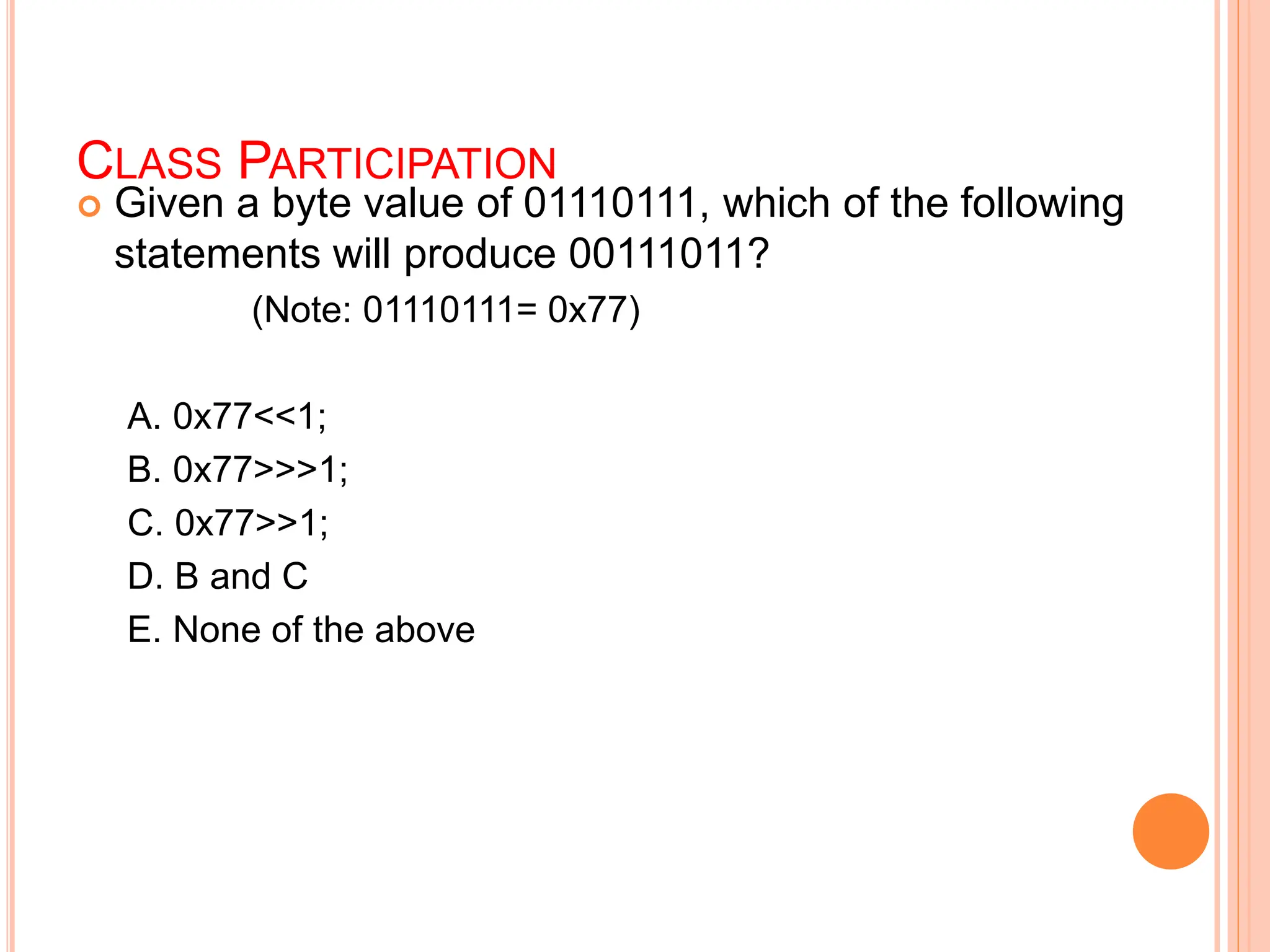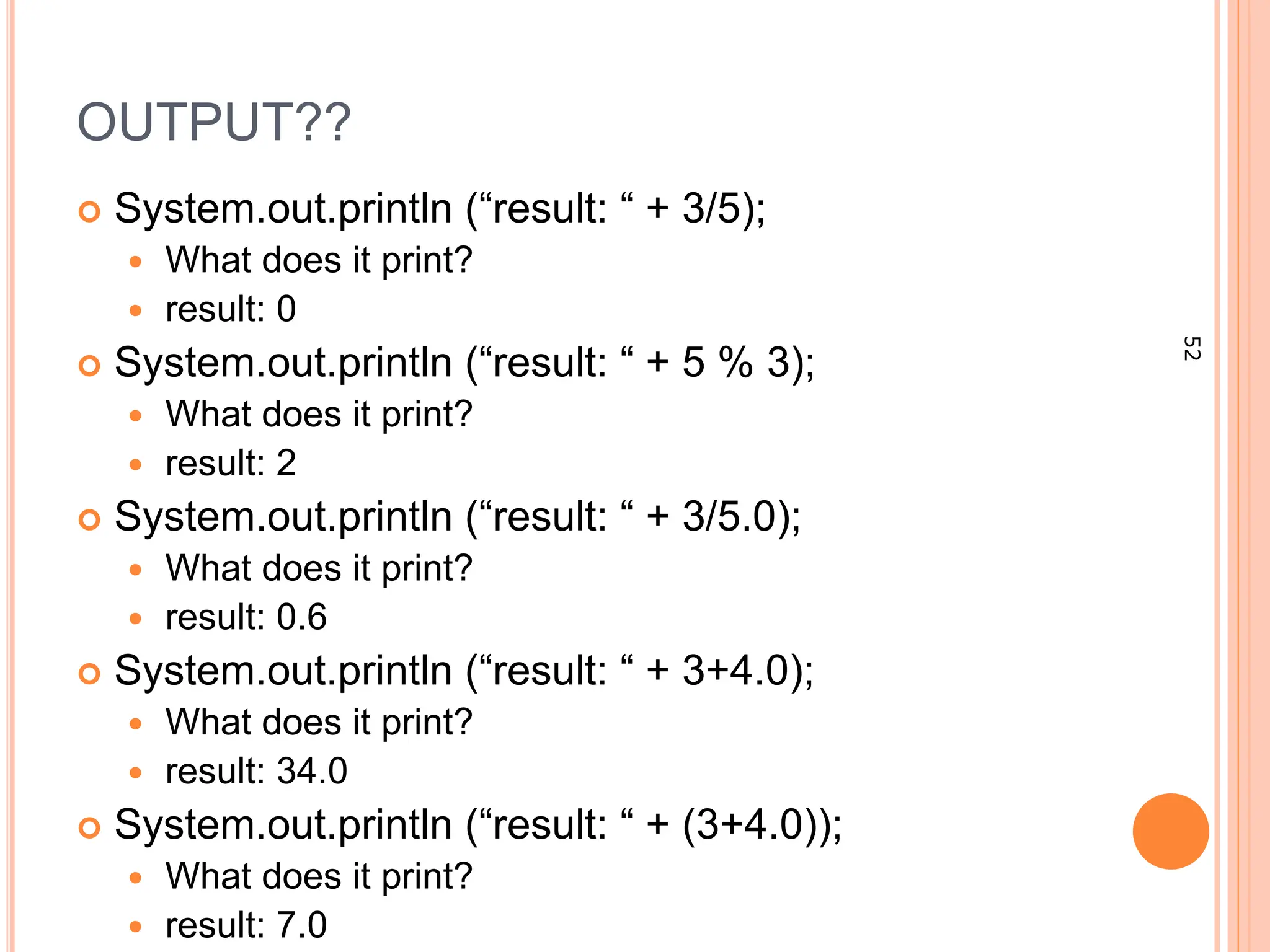This document provides an overview of object oriented programming topics including arrays and Java operators. It discusses single and multi-dimensional arrays, how to declare, create, initialize, and index arrays. It also covers the different types of Java operators such as assignment, arithmetic, relational, logical, and bitwise operators. Examples are provided to demonstrate how to use arrays and each type of operator in Java code.


![ARRAYS An array is a group of liked-typed variables referred to by a common name, with individual variables accessed by their index. Arrays are: 1) declared, 2) created, 3) initialized 4) used Also, arrays can have one or several dimensions. Array declaration involves: 1) declaring an array identifier 2) declaring the number of dimensions 3) declaring the data type of the array elements Two styles of array declaration: type array-variable[ ]; or type [ ] array-variable;](https://image.slidesharecdn.com/lec0320240115-240318141523-30498254/75/object-oriented-programming-java-lectures-3-2048.jpg)
![ARRAY CREATION After declaration, no array actually exists. In order to create an array, we use the new operator: type array-variable[ ]; array-variable = new type[size]; This creates a new array to hold size elements of type type, whose reference will be kept in the variable array-variable.](https://image.slidesharecdn.com/lec0320240115-240318141523-30498254/75/object-oriented-programming-java-lectures-4-2048.jpg)
![ARRAY INDEXING Later we can refer to the elements of this array through their indexes: array-variable[index] The array index always starts with zero! The Java run-time system makes sure that all array indexes are in the correct range, otherwise raises a run-time error.](https://image.slidesharecdn.com/lec0320240115-240318141523-30498254/75/object-oriented-programming-java-lectures-5-2048.jpg)
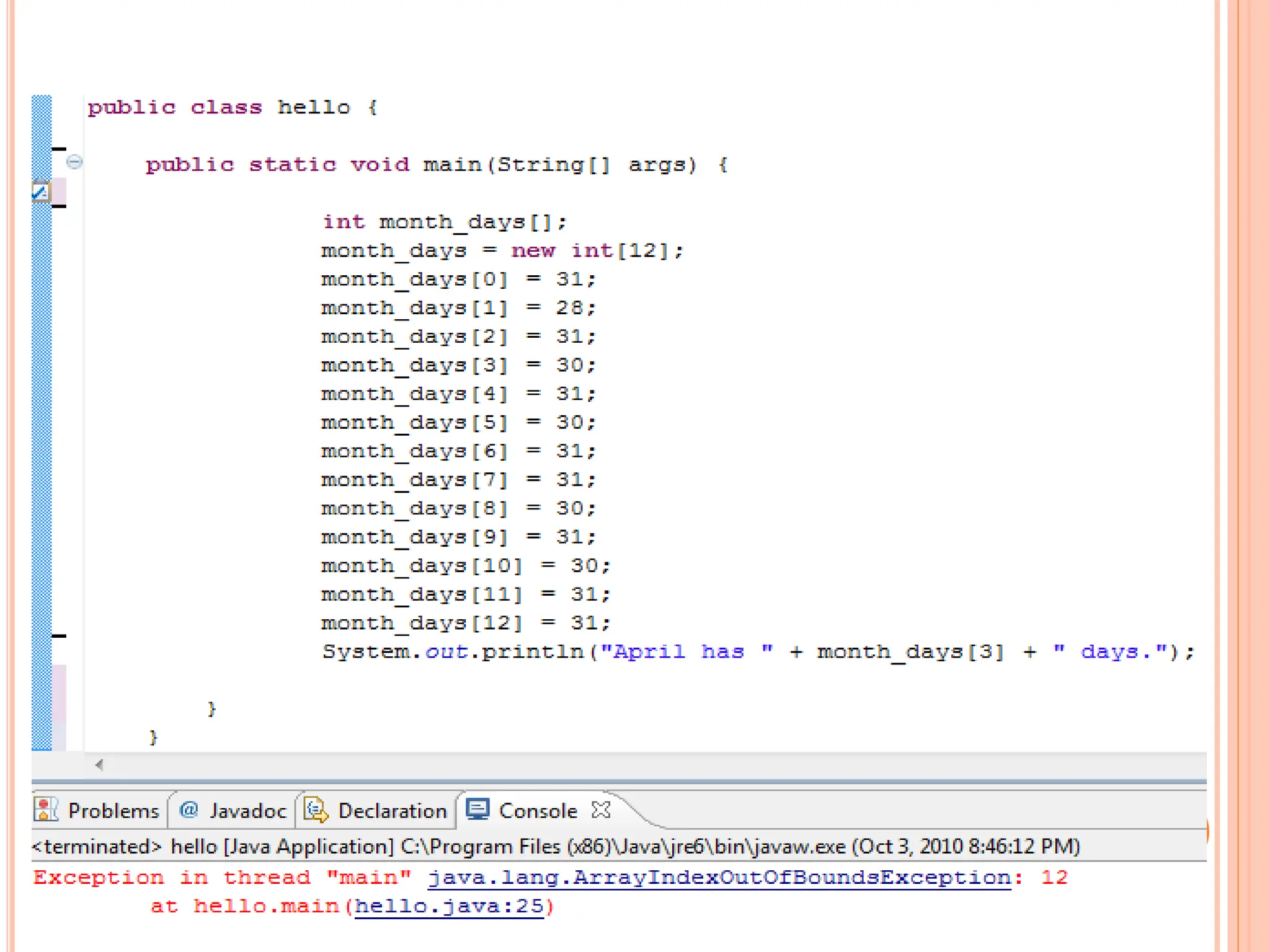
![ARRAY INITIALIZATION Arrays can be initialized when they are declared: int monthDays[ ] = {31,28,31,30,31,30,31,31,30,31,30,31}; Comments: 1) there is no need to use the new operator 2) the array is created large enough to hold all specified elements](https://image.slidesharecdn.com/lec0320240115-240318141523-30498254/75/object-oriented-programming-java-lectures-7-2048.jpg)
![MULTI-DIMENSIONAL ARRAY Multidimensional arrays are arrays of arrays: 1) declaration int array[ ][ ]; 2) creation int array = new int[2][3]; 3) initialization int array[ ][ ] = { {1, 2, 3}, {4, 5, 6} };](https://image.slidesharecdn.com/lec0320240115-240318141523-30498254/75/object-oriented-programming-java-lectures-8-2048.jpg)
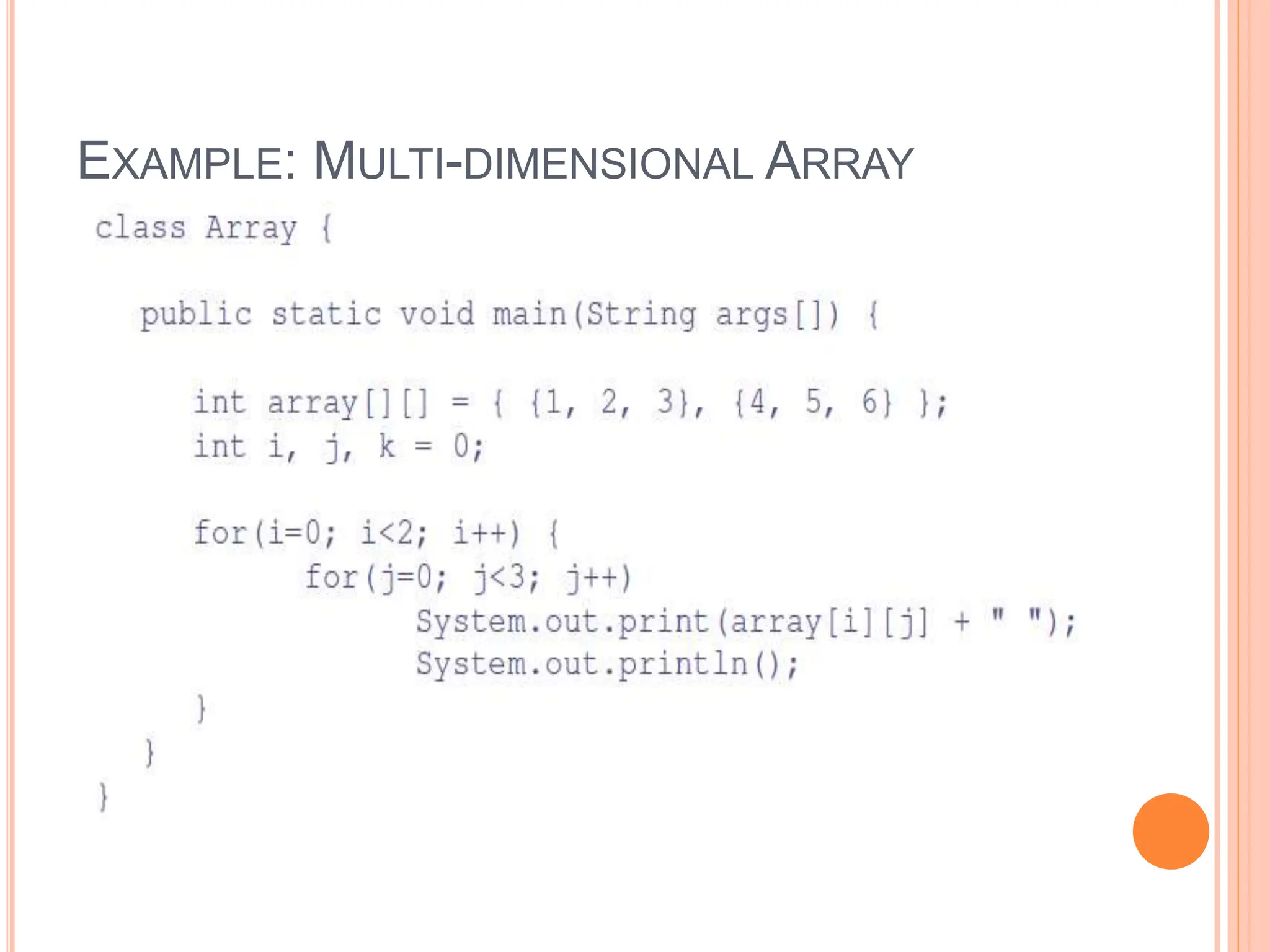
![e-Macao-16-2-134 EXERCISE: ARRAYS 1) Write a program that creates an array of 10 integers with the initial values of 3. 2) Write a Java program to find the average of a sequence of nonnegative numbers entered by the user, where the user enters a negative number to terminate the input. Assume the only method in the class is the main method. 3) What's the index of the first and the last component of a one hundred component array? 4) What will happen if you try to compile and run the following code? public class Q { public static void main(String argv[]){ int var[]=new int[5]; System.out.println(var[0]); } }](https://image.slidesharecdn.com/lec0320240115-240318141523-30498254/75/object-oriented-programming-java-lectures-10-2048.jpg)
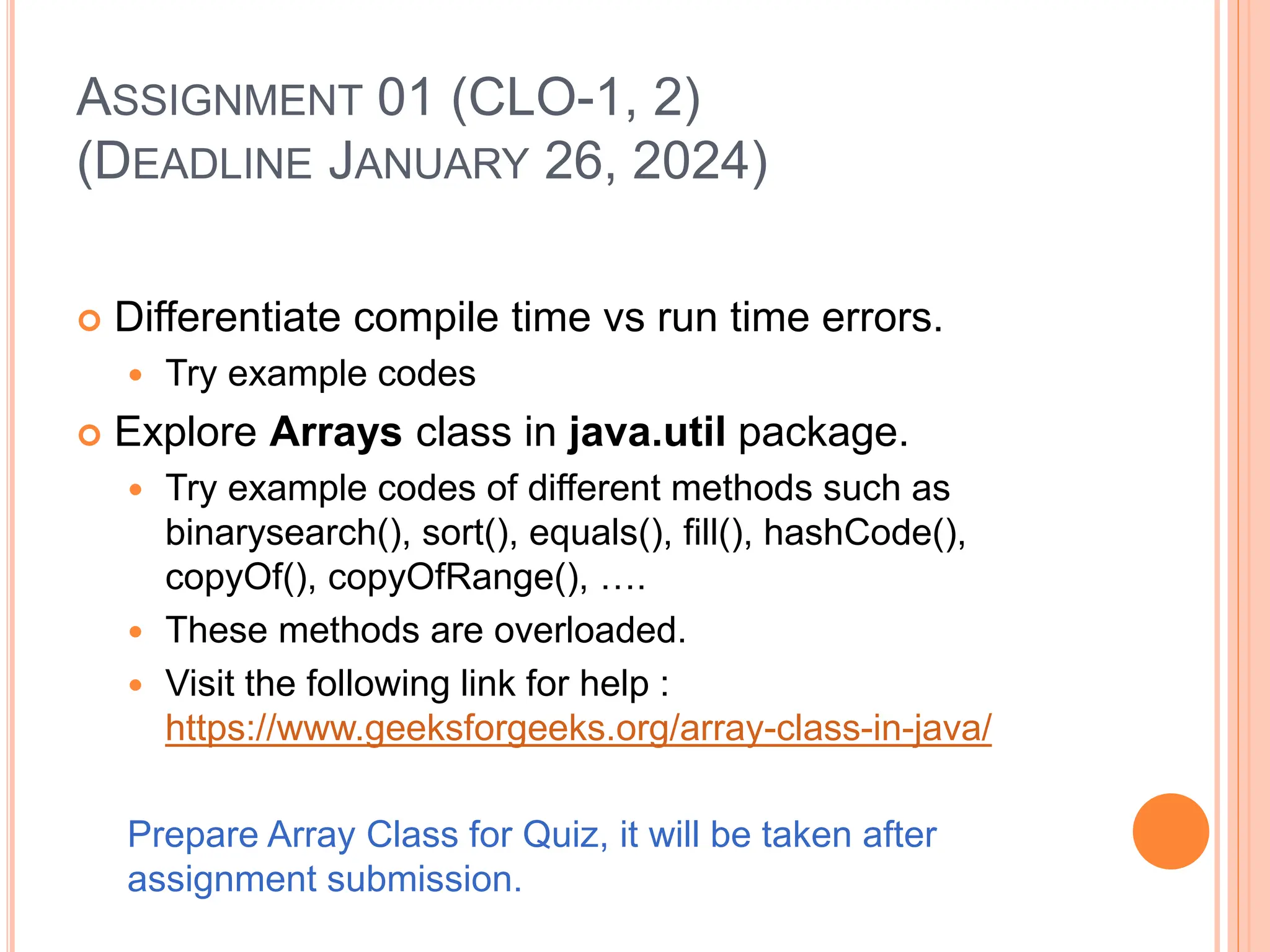
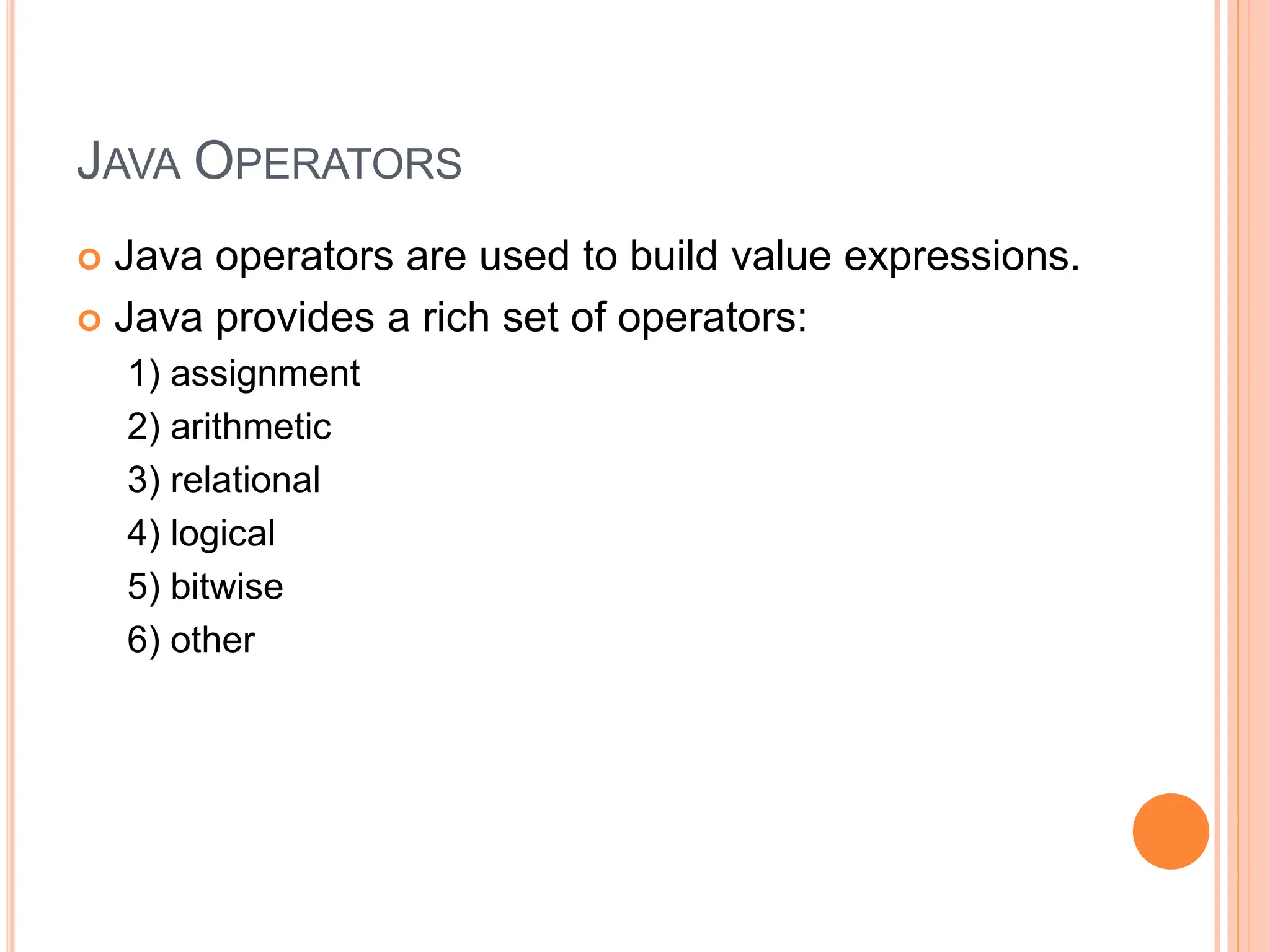
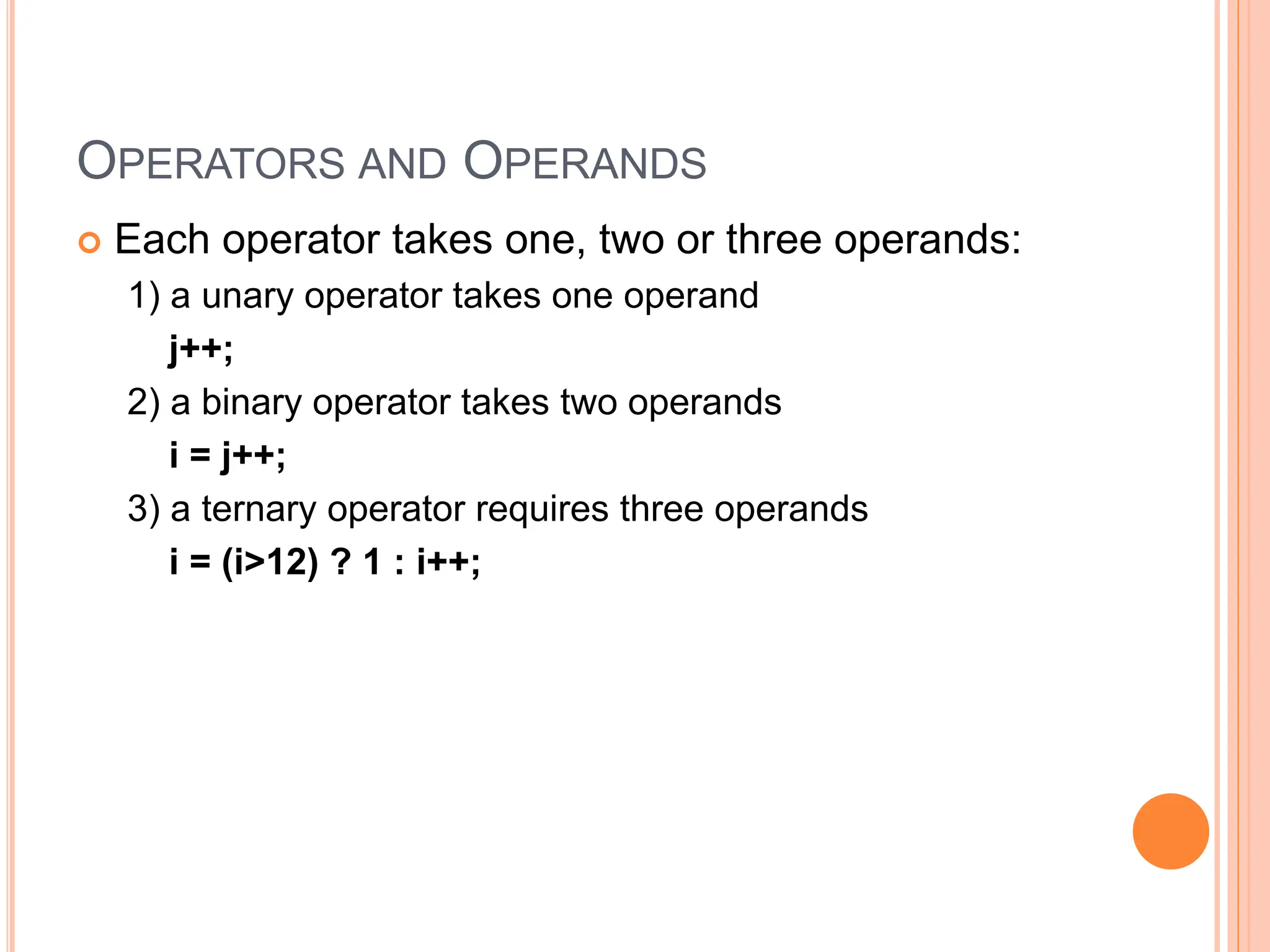
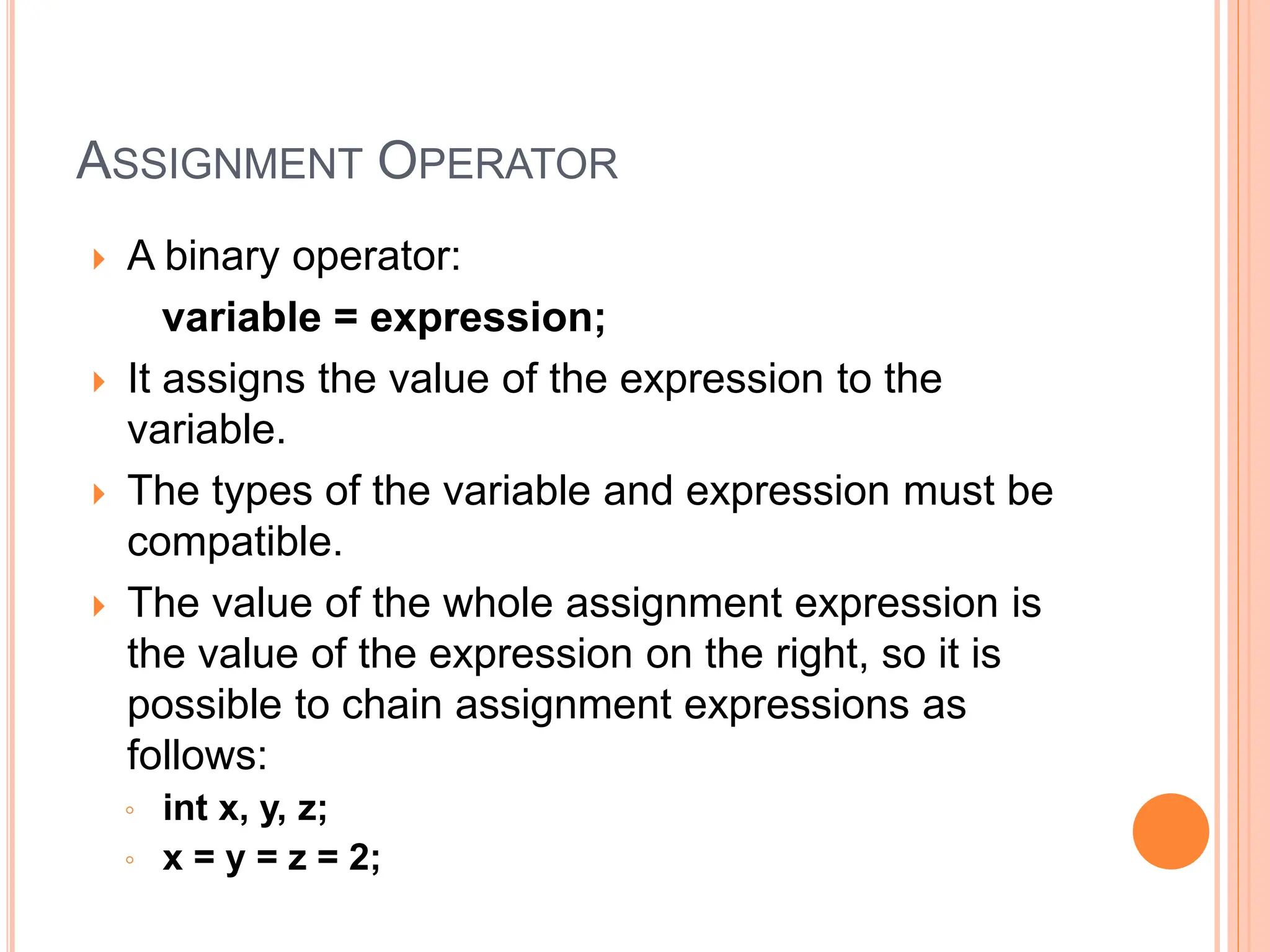
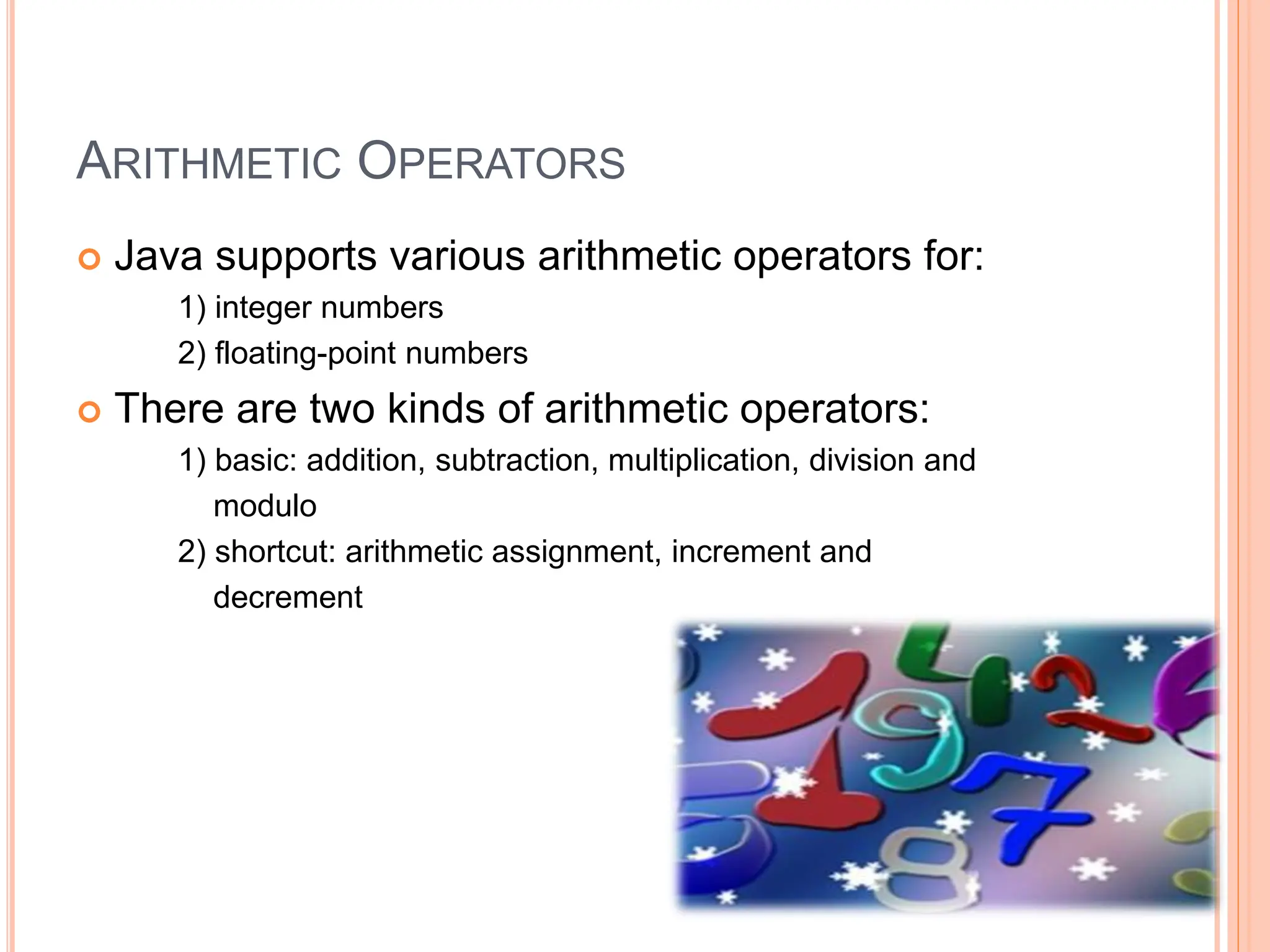
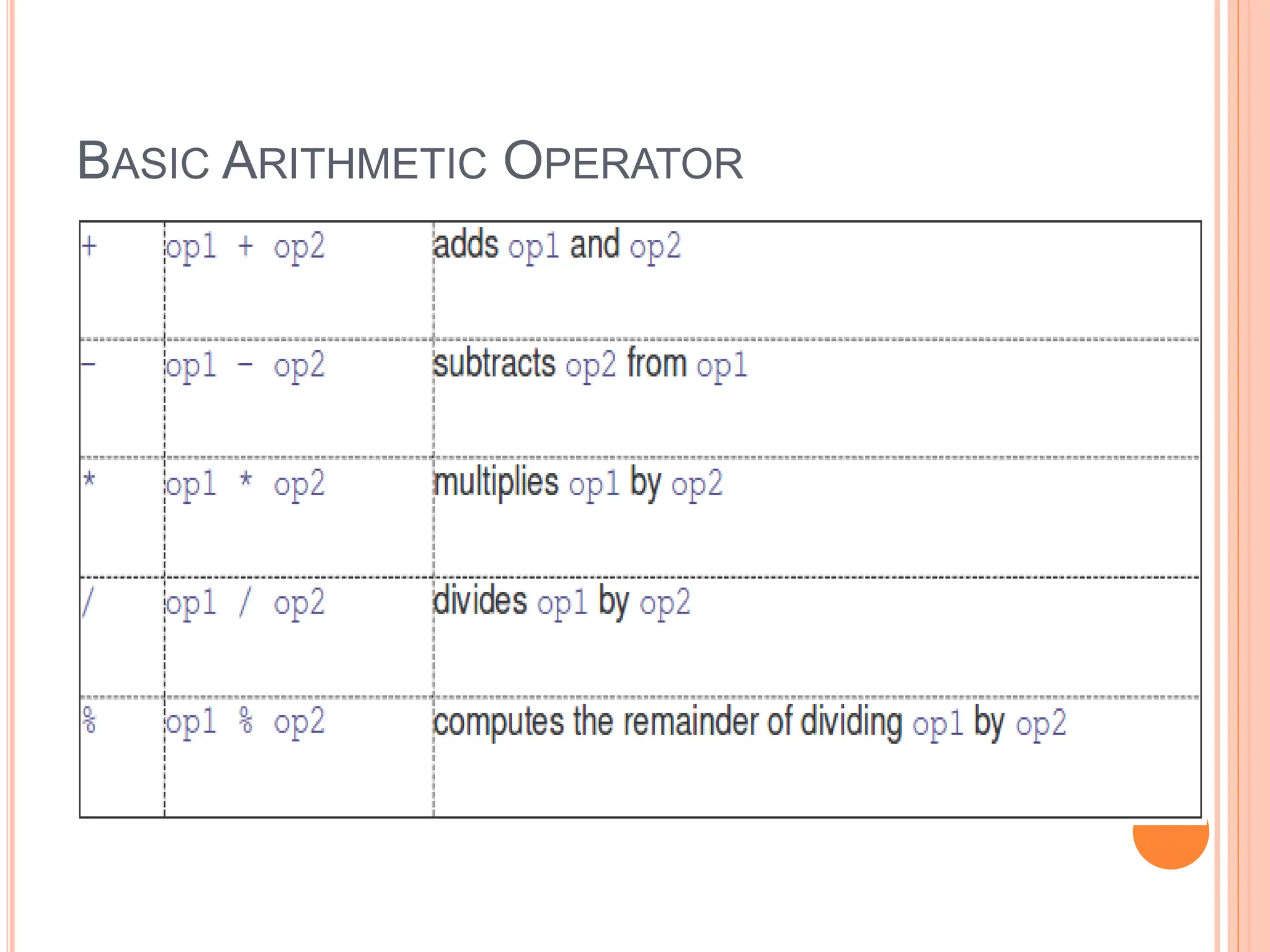
![SIMPLE ARITHMETIC public class Example { public static void main(String[] args) { int j, k, p, q, r, s, t; j = 5; k = 2; p = j + k; q = j - k; r = j * k; s = j / k; t = j % k; System.out.println("p = " + p); System.out.println("q = " + q); System.out.println("r = " + r); System.out.println("s = " + s); System.out.println("t = " + t); } } > java Example p = 7 q = 3 r = 10 s = 2 t = 1 >](https://image.slidesharecdn.com/lec0320240115-240318141523-30498254/75/object-oriented-programming-java-lectures-17-2048.jpg)
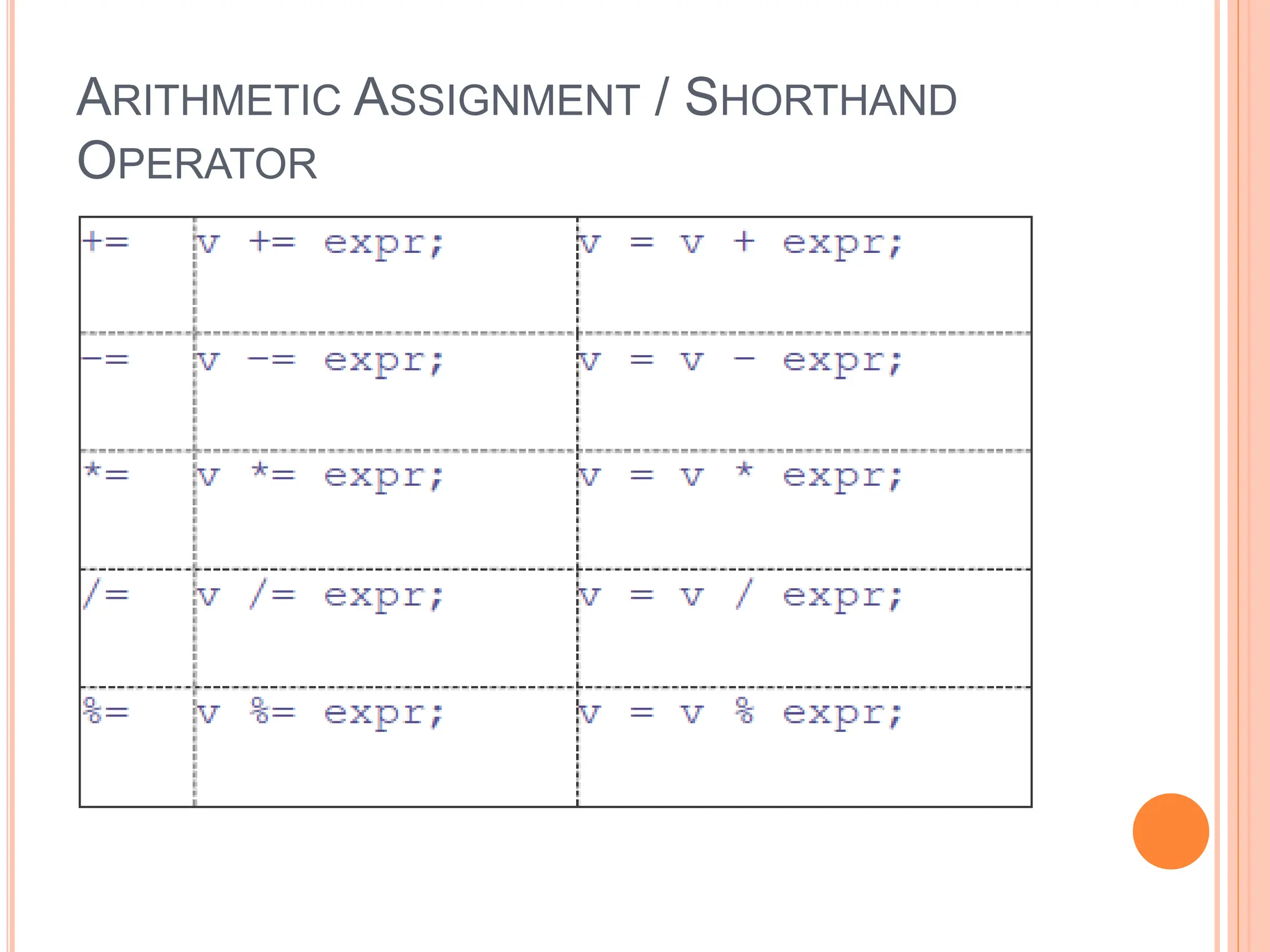
![SHORTHAND OPERATOR public class Example { public static void main(String[] args) { int j, p, q, r, s, t; j = 5; p = 1; q = 2; r = 3; s = 4; t = 5; p += j; q -= j; r *= j; s /= j; t %= j; System.out.println("p = " + p); System.out.println("q = " + q); System.out.println("r = " + r); System.out.println("s = " + s); System.out.println("t = " + t); } } > java Example p = 6 q = -3 r = 15 s = 0 t = 0 >](https://image.slidesharecdn.com/lec0320240115-240318141523-30498254/75/object-oriented-programming-java-lectures-19-2048.jpg)
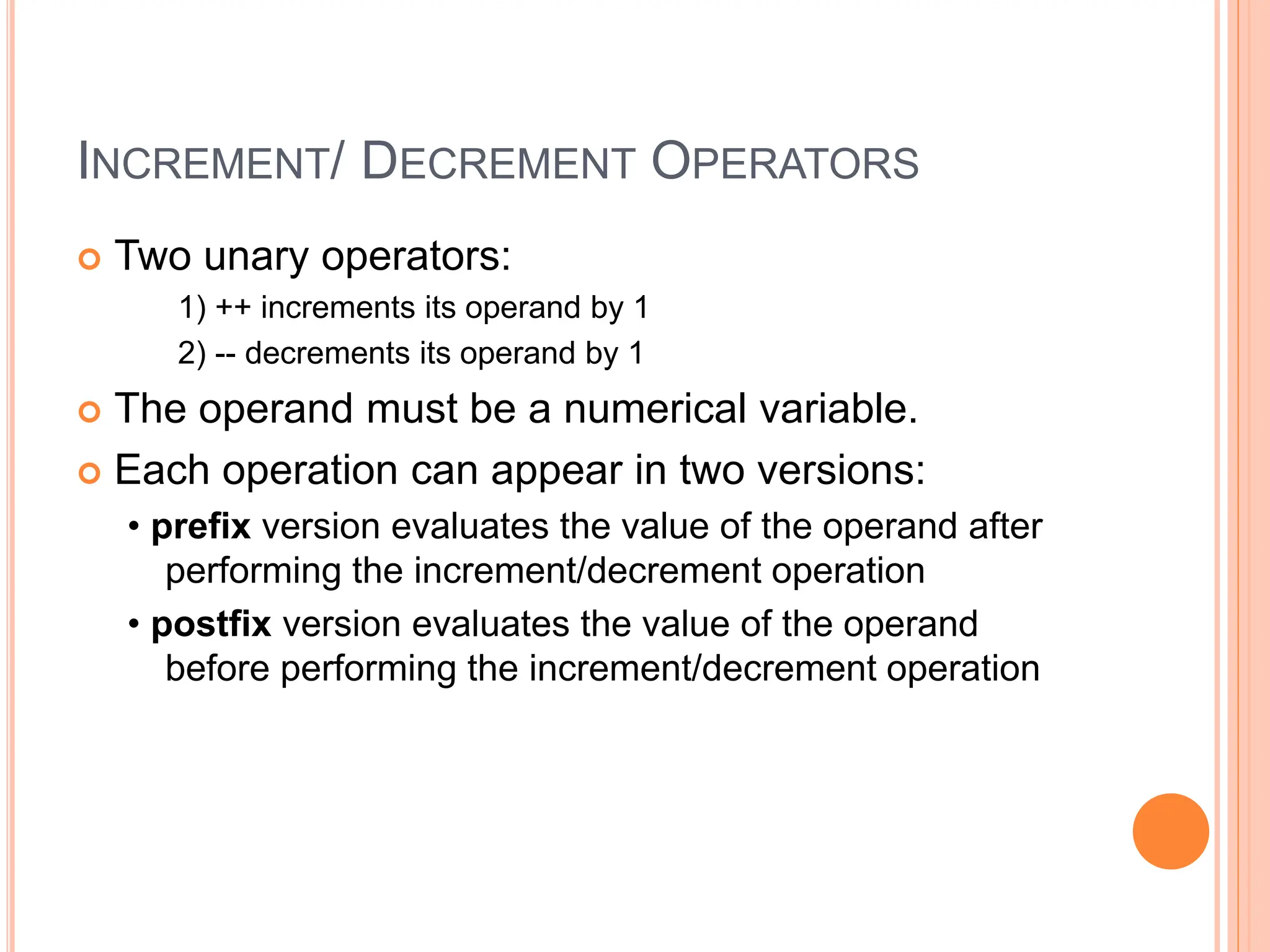
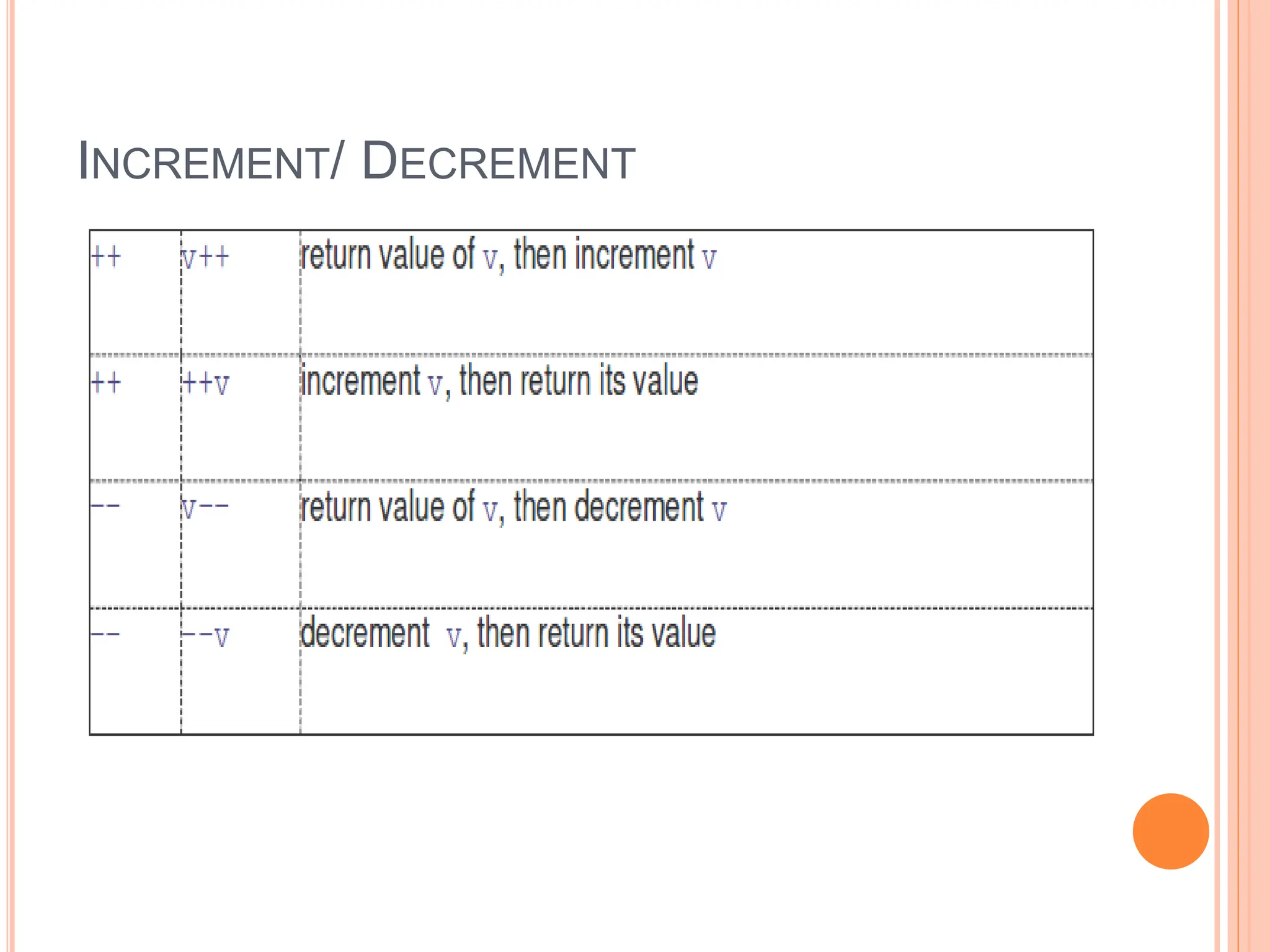
![INCREMENT AND DECREMENT public class Example { public static void main(String[] args) { int j, p, q, r, s; j = 5; p = ++j; // j = j + 1; p = j; System.out.println("p = " + p); q = j++; // q = j; j = j + 1; System.out.println("q = " + q); System.out.println("j = " + j); r = --j; // j = j -1; r = j; System.out.println("r = " + r); s = j--; // s = j; j = j - 1; System.out.println("s = " + s); } } > java example p = 6 q = 6 j = 7 r = 6 s = 6 >](https://image.slidesharecdn.com/lec0320240115-240318141523-30498254/75/object-oriented-programming-java-lectures-22-2048.jpg)
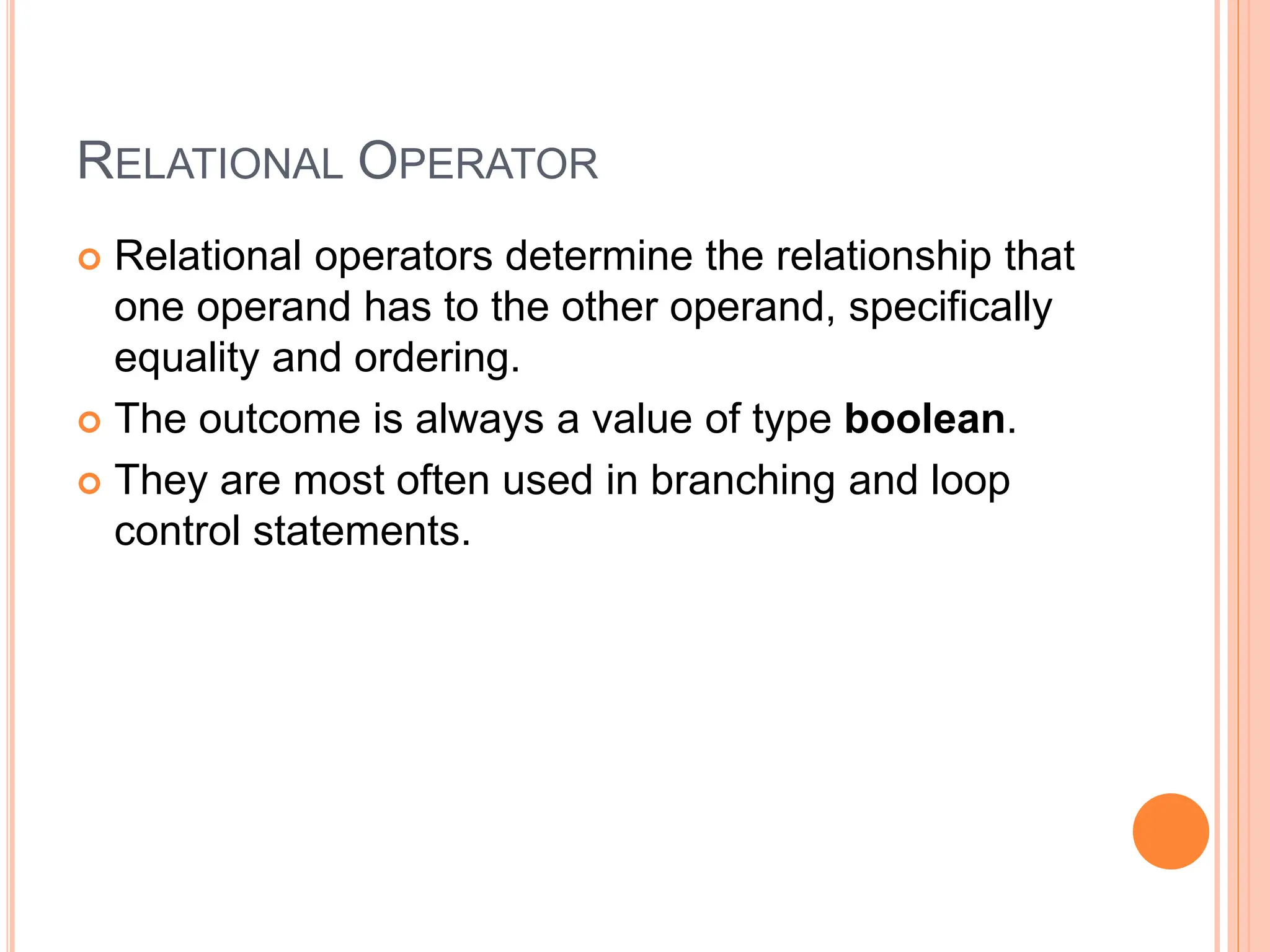
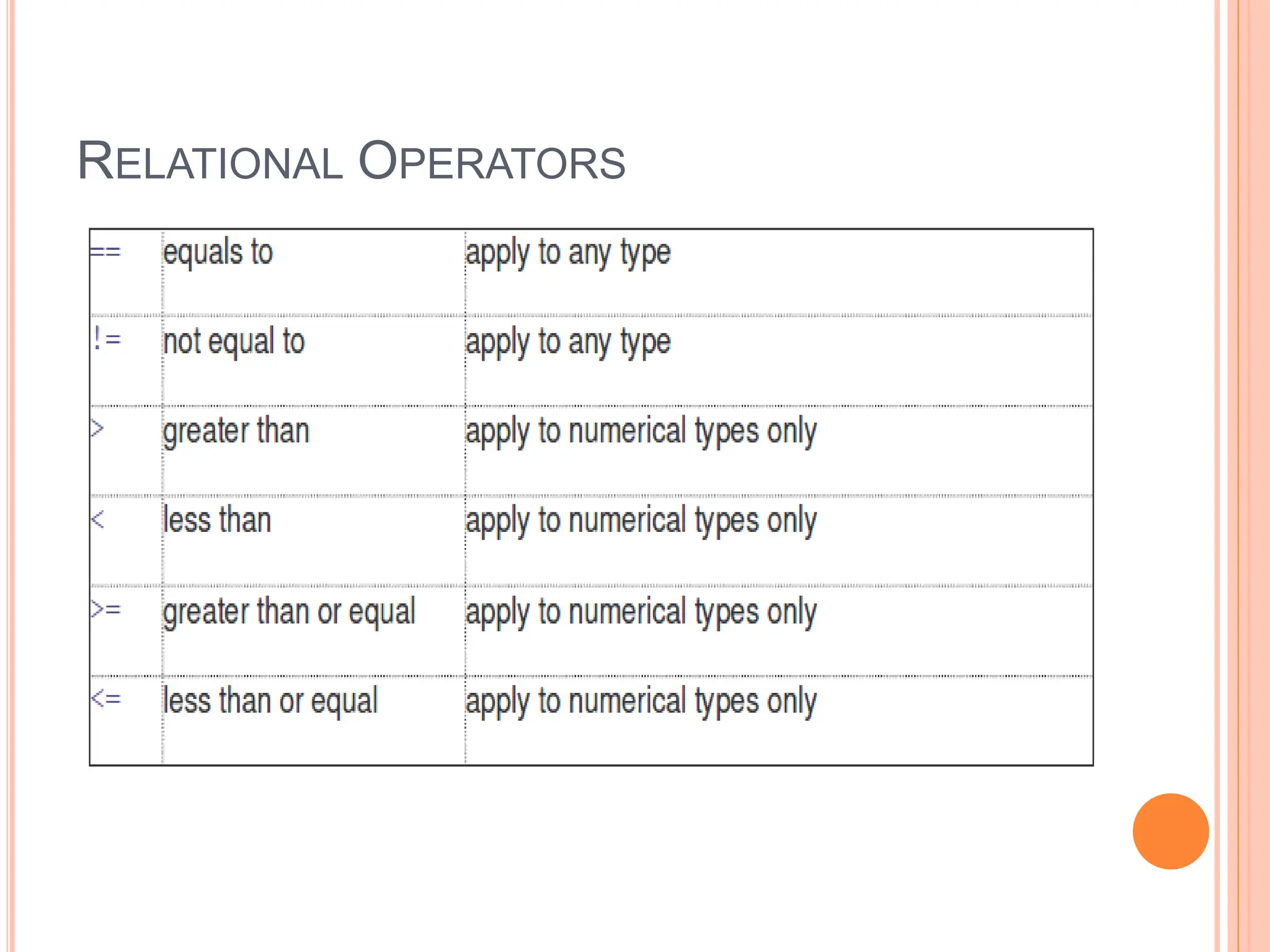
![RELATIONAL OPERATOR EXAMPLES public class Example { public static void main(String[] args) { int p =2; int q = 2; int r = 3; System.out.println("p < r " + (p < r)); System.out.println("p > r " + (p > r)); System.out.println("p == q " + (p == q)); System.out.println("p != q " + (p != q)); } } > java Example p < r true p > r false p == q true p != q false >](https://image.slidesharecdn.com/lec0320240115-240318141523-30498254/75/object-oriented-programming-java-lectures-25-2048.jpg)
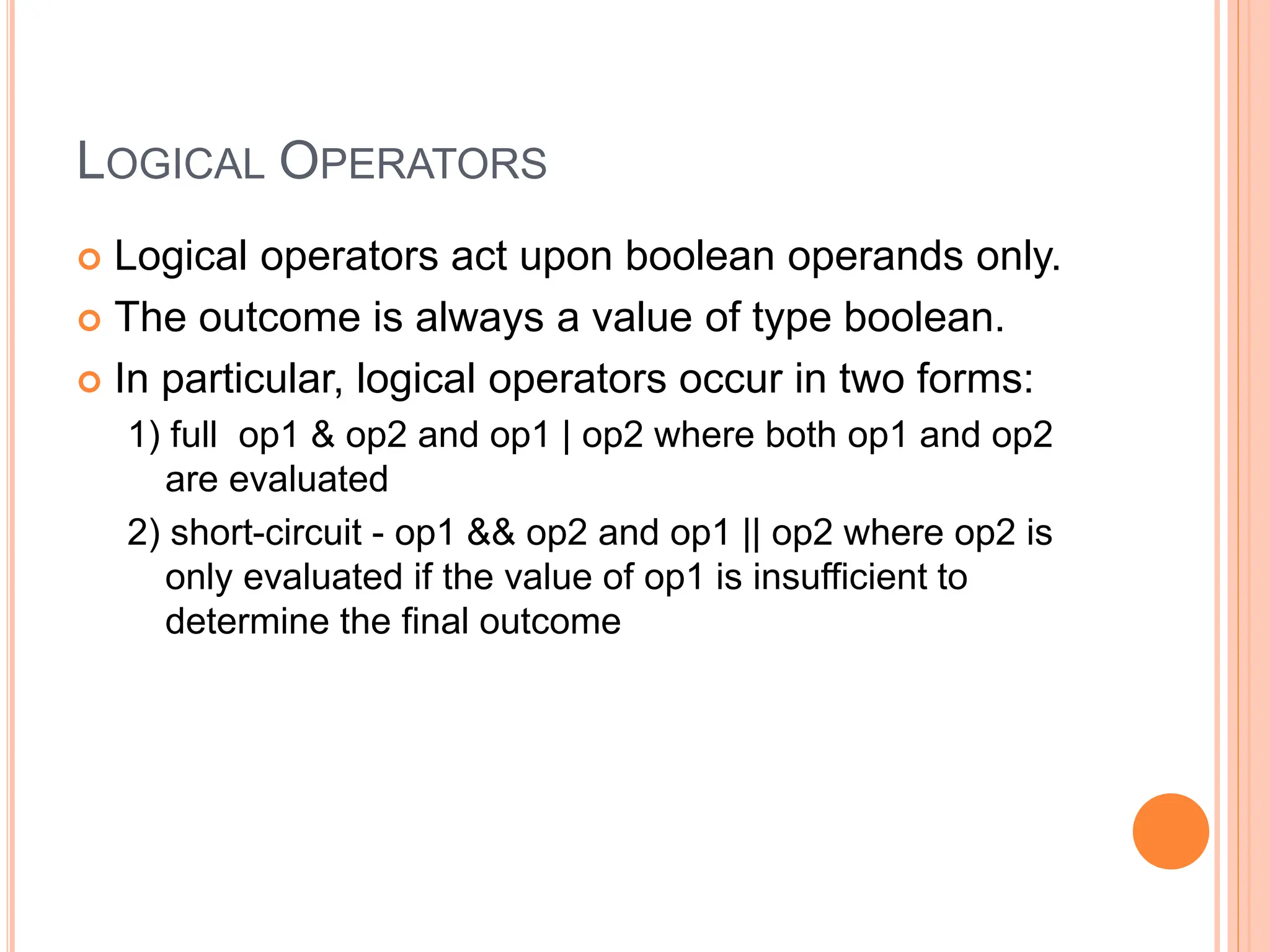
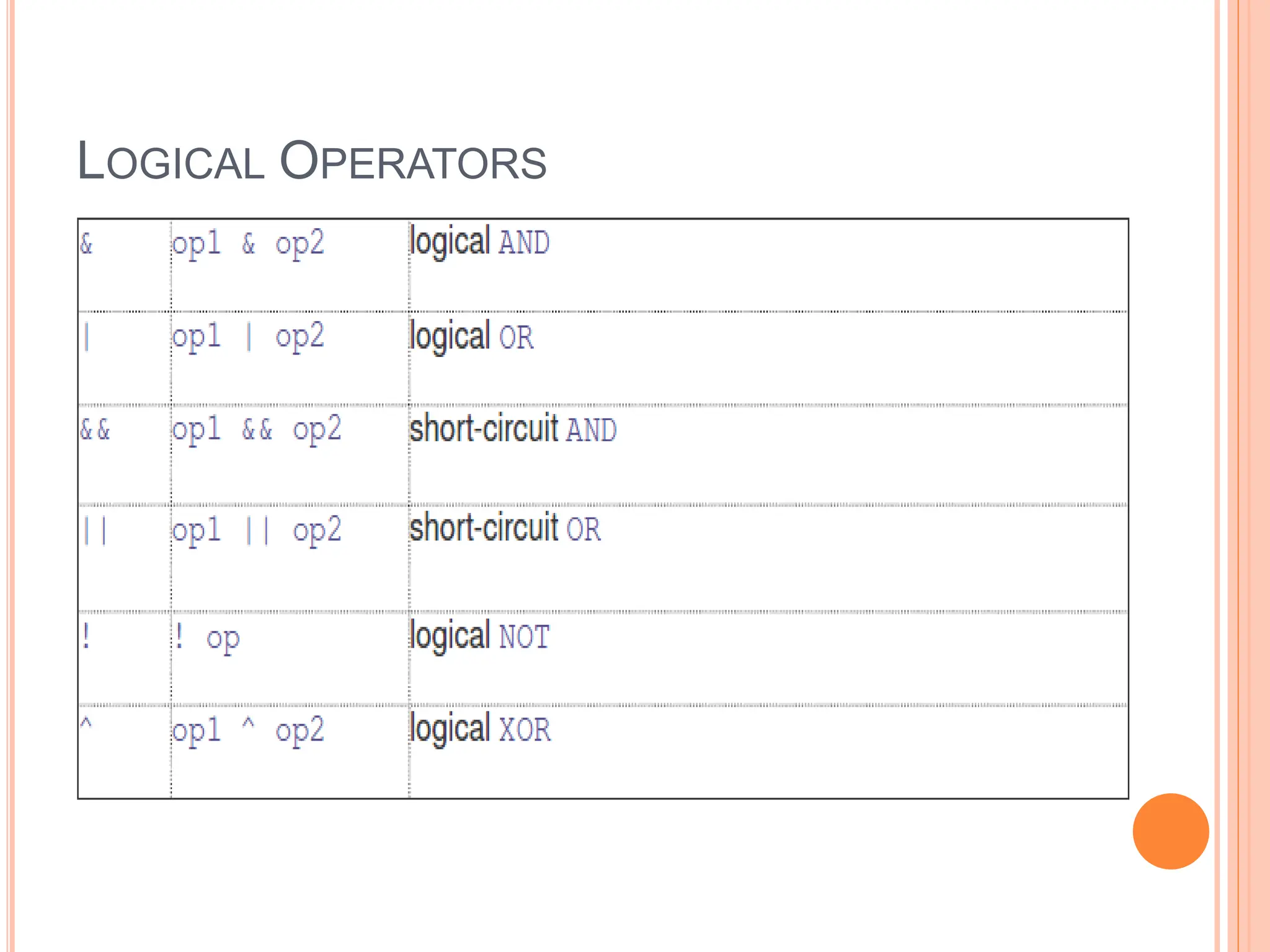
![LOGICAL (&&) OPERATOR EXAMPLES public class Example { public static void main(String[] args) { boolean t = true; boolean f = false; System.out.println("f && f " + (f && f)); System.out.println("f && t " + (f && t)); System.out.println("t && f " + (t && f)); System.out.println("t && t " + (t && t)); } } > java Example f && f false f && t false t && f false t && t true >](https://image.slidesharecdn.com/lec0320240115-240318141523-30498254/75/object-oriented-programming-java-lectures-28-2048.jpg)
![LOGICAL (||) OPERATOR EXAMPLES public class Example { public static void main(String[] args) { boolean t = true; boolean f = false; System.out.println("f || f " + (f || f)); System.out.println("f || t " + (f || t)); System.out.println("t || f " + (t || f)); System.out.println("t || t " + (t || t)); } } > java Example f || f false f || t true t || f true t || t true >](https://image.slidesharecdn.com/lec0320240115-240318141523-30498254/75/object-oriented-programming-java-lectures-29-2048.jpg)
![LOGICAL (!) OPERATOR EXAMPLES public class Example { public static void main(String[] args) { boolean t = true; boolean f = false; System.out.println("!f " + !f); System.out.println("!t " + !t); } } > java Example !f true !t false >](https://image.slidesharecdn.com/lec0320240115-240318141523-30498254/75/object-oriented-programming-java-lectures-30-2048.jpg)
![LOGICAL OPERATOR EXAMPLES SHORT CIRCUITING WITH && public class Example { public static void main(String[] args) { boolean b; int j, k; j = 0; k = 0; b = ( j++ == k ) && ( j == ++k ); System.out.println("b, j, k " + b + ", " + j + ", " + k); j = 0; k = 0; b = ( j++ != k ) && ( j == ++k ); System.out.println("b, j, k " + b + ", " + j + ", " + k); } } > java Example b, j, k true 1, 1 > java Example b, j, k true 1, 1 b, j, k false 1, 0 >](https://image.slidesharecdn.com/lec0320240115-240318141523-30498254/75/object-oriented-programming-java-lectures-31-2048.jpg)
![LOGICAL OPERATOR EXAMPLES SHORT CIRCUITING WITH || public class Example { public static void main(String[] args) { boolean b; int j, k; j = 0; k = 0; b = ( j++ == k ) || ( j == ++k ); System.out.println("b, j, k " + b + ", " + j + ", " + k); j = 0; k = 0; b = ( j++ != k ) || ( j == ++k ); System.out.println("b, j, k " + b + ", " + j + ", " + k); } } > java Example b, j, k true 1, 0 > java Example b, j, k true 1, 0 b, j, k true 1, 1 >](https://image.slidesharecdn.com/lec0320240115-240318141523-30498254/75/object-oriented-programming-java-lectures-32-2048.jpg)
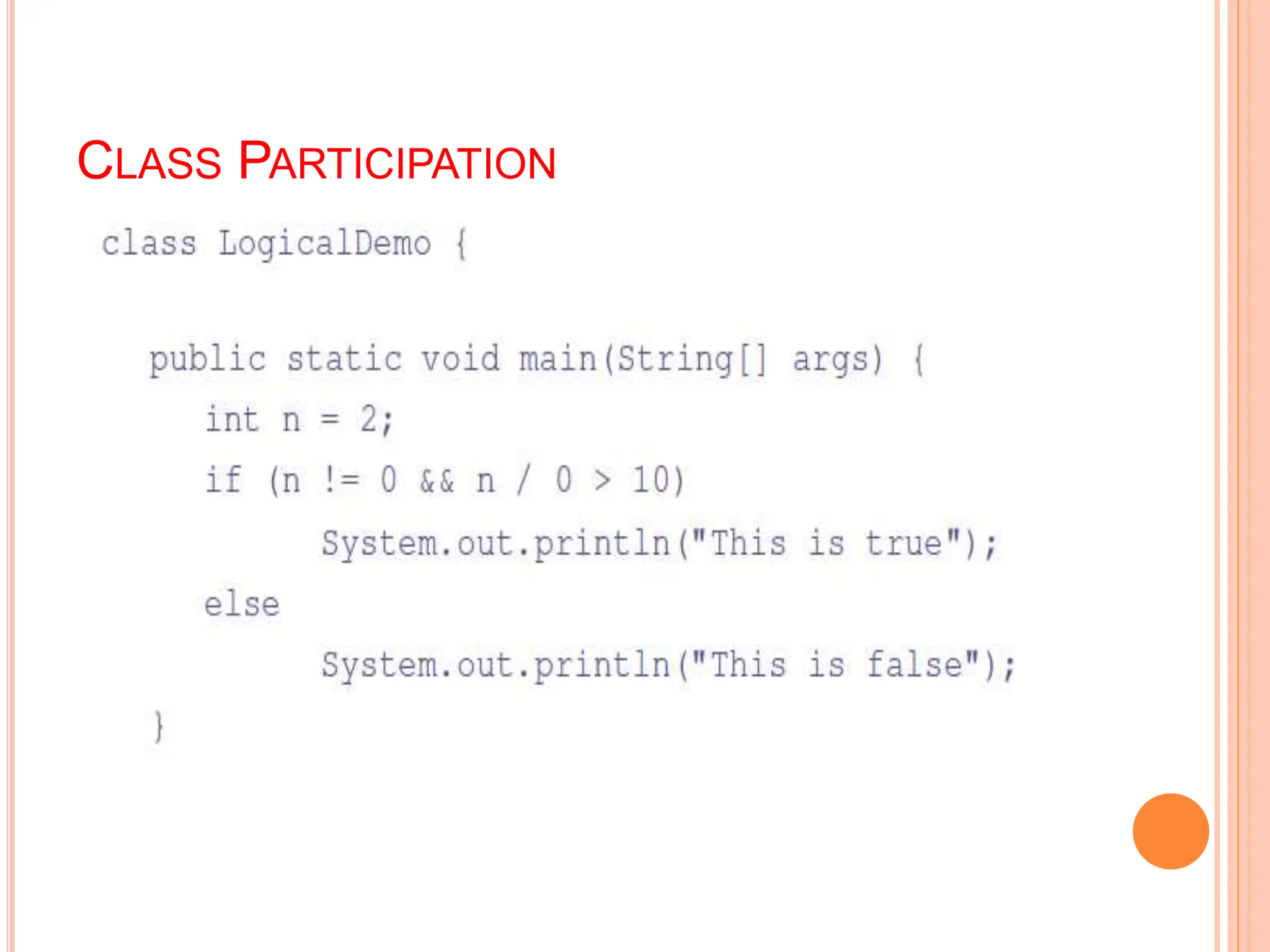
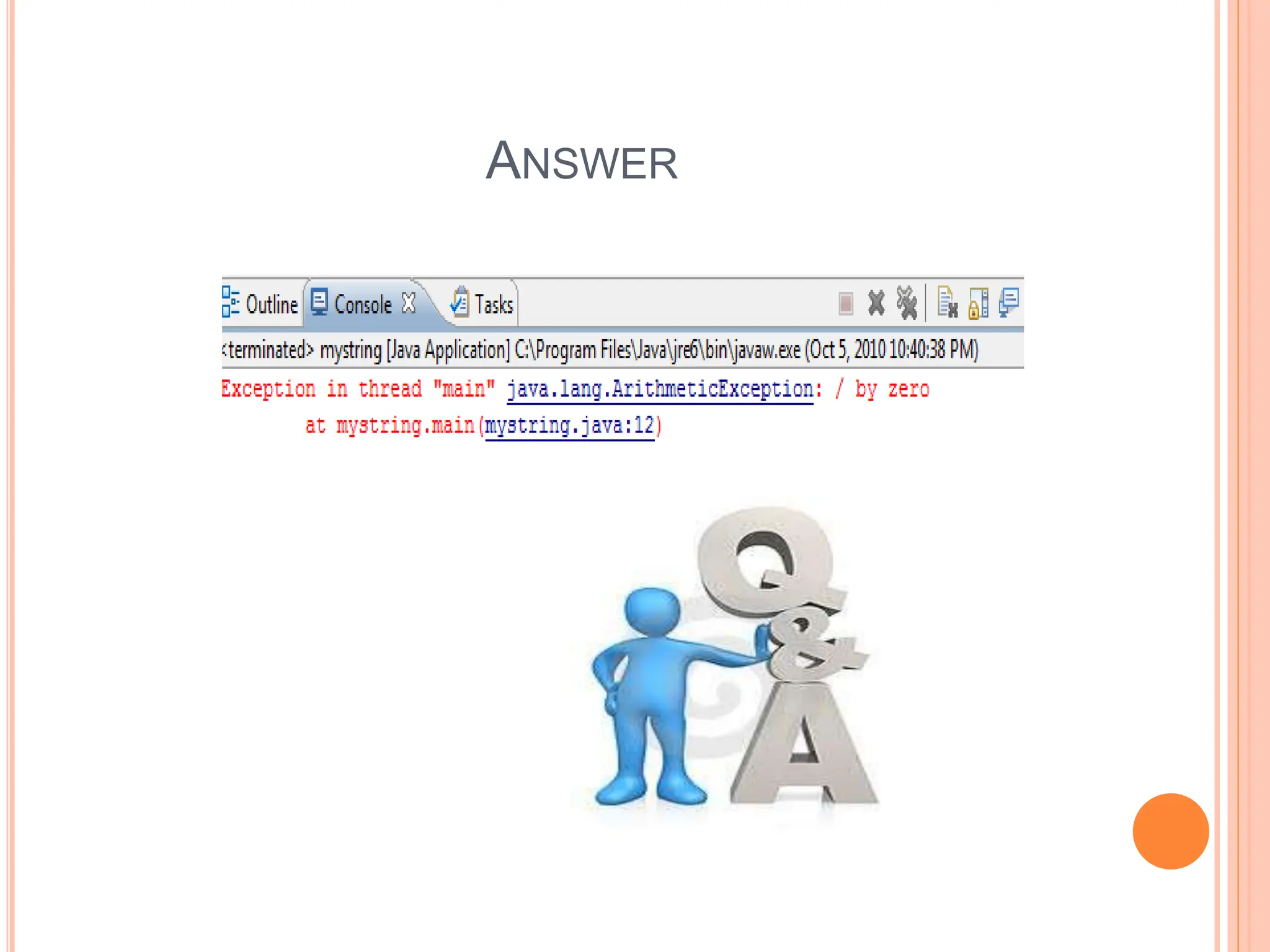
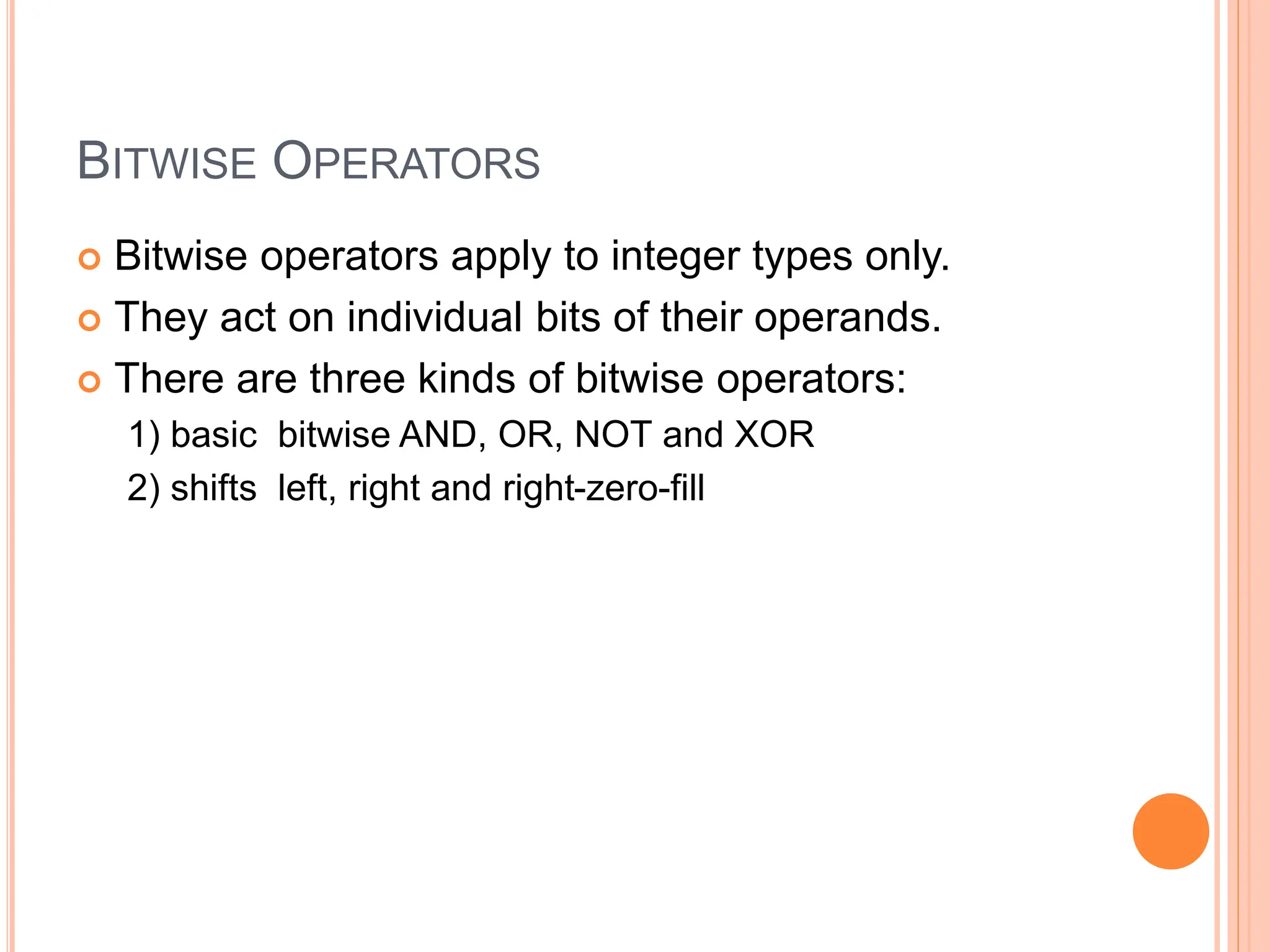
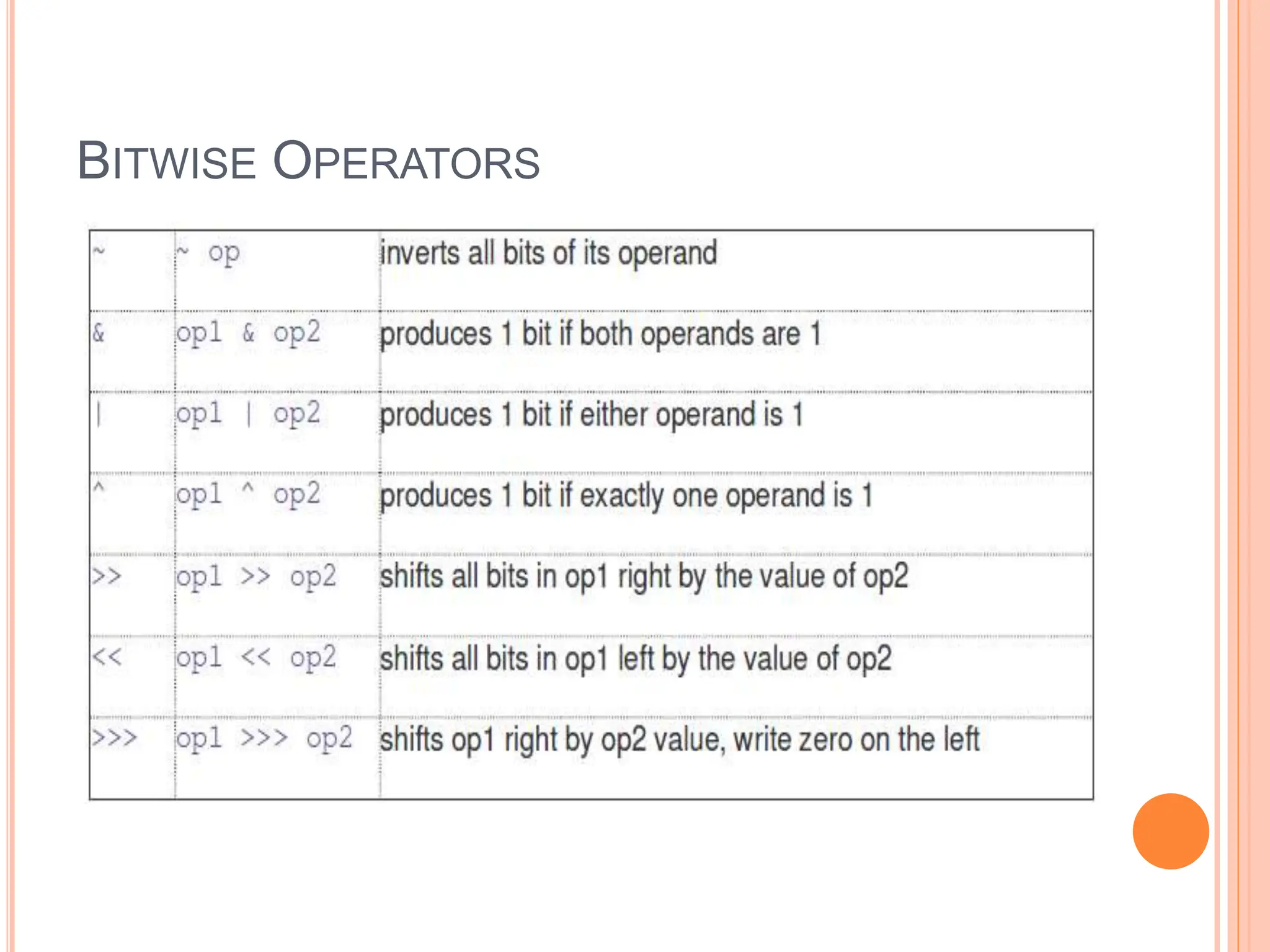
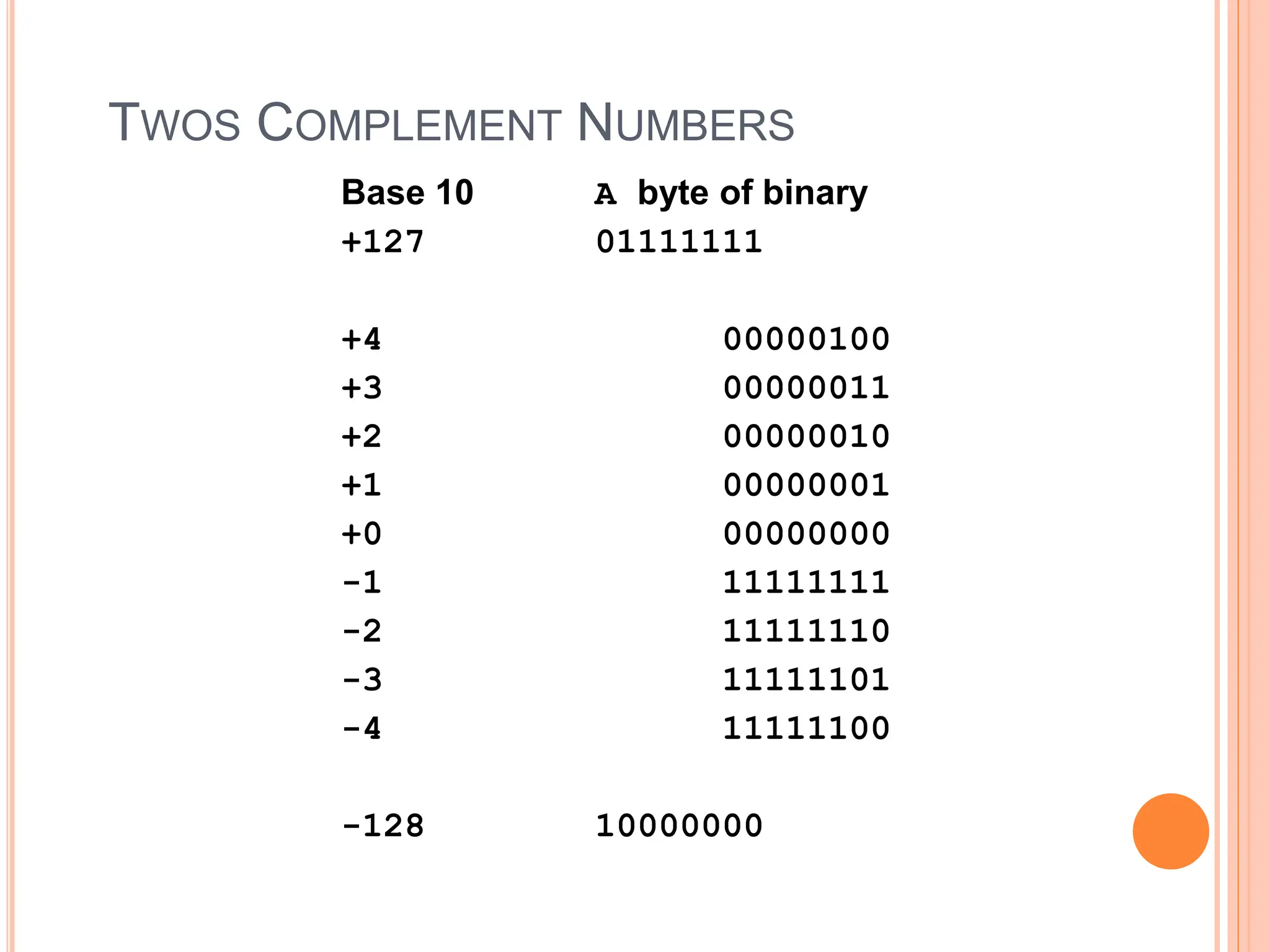
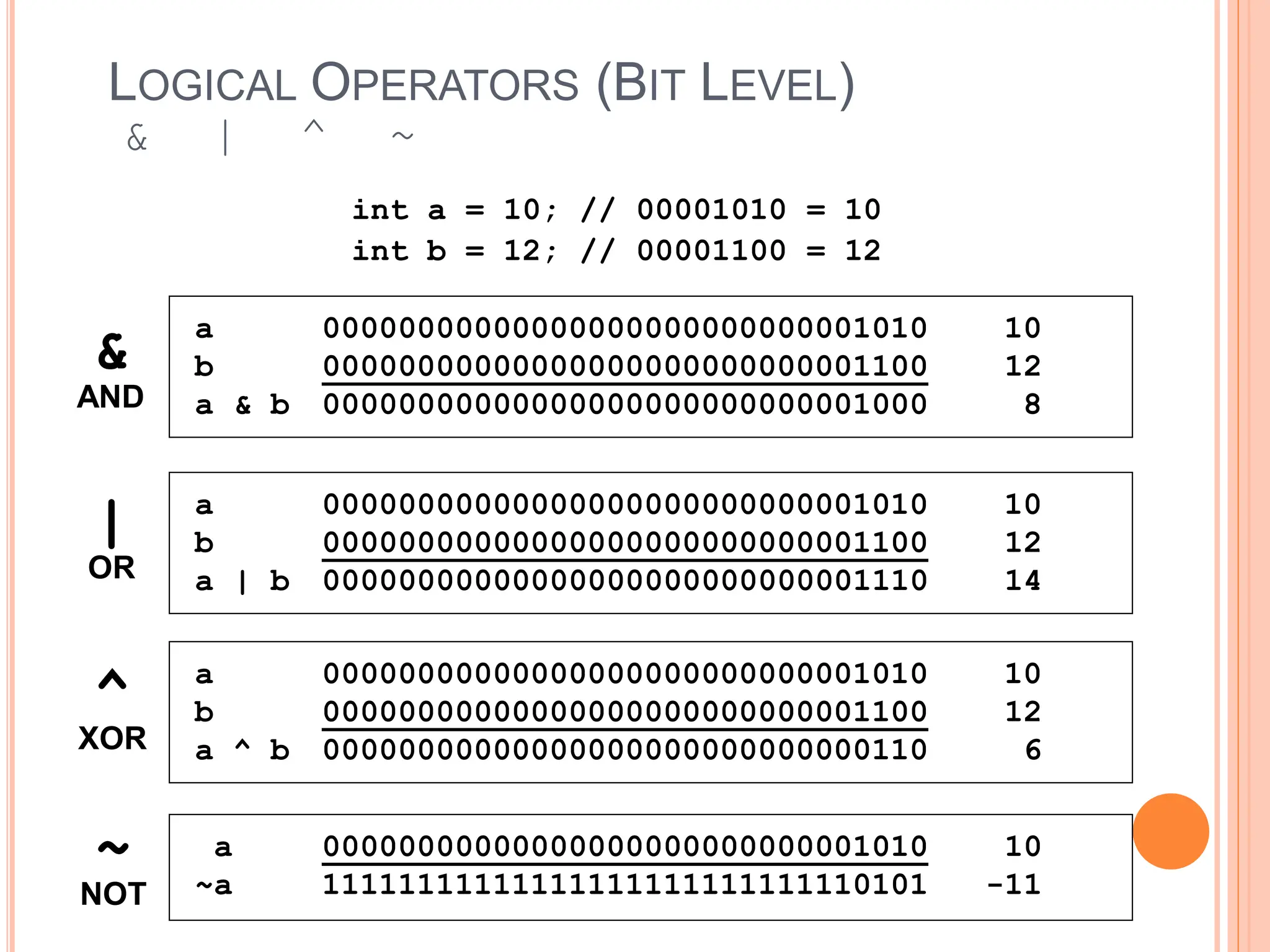
![LOGICAL (BIT) OPERATOR EXAMPLES public class Example { public static void main(String[] args) { int a = 10; // 00001010 = 10 int b = 12; // 00001100 = 12 int and, or, xor, na; and = a & b; // 00001000 = 8 or = a | b; // 00001110 = 14 xor = a ^ b; // 00000110 = 6 na = ~a; // 11110101 = -11 System.out.println("and " + and); System.out.println("or " + or); System.out.println("xor " + xor); System.out.println("na " + na); } } > java Example and 8 or 14 xor 6 na -11 >](https://image.slidesharecdn.com/lec0320240115-240318141523-30498254/75/object-oriented-programming-java-lectures-39-2048.jpg)
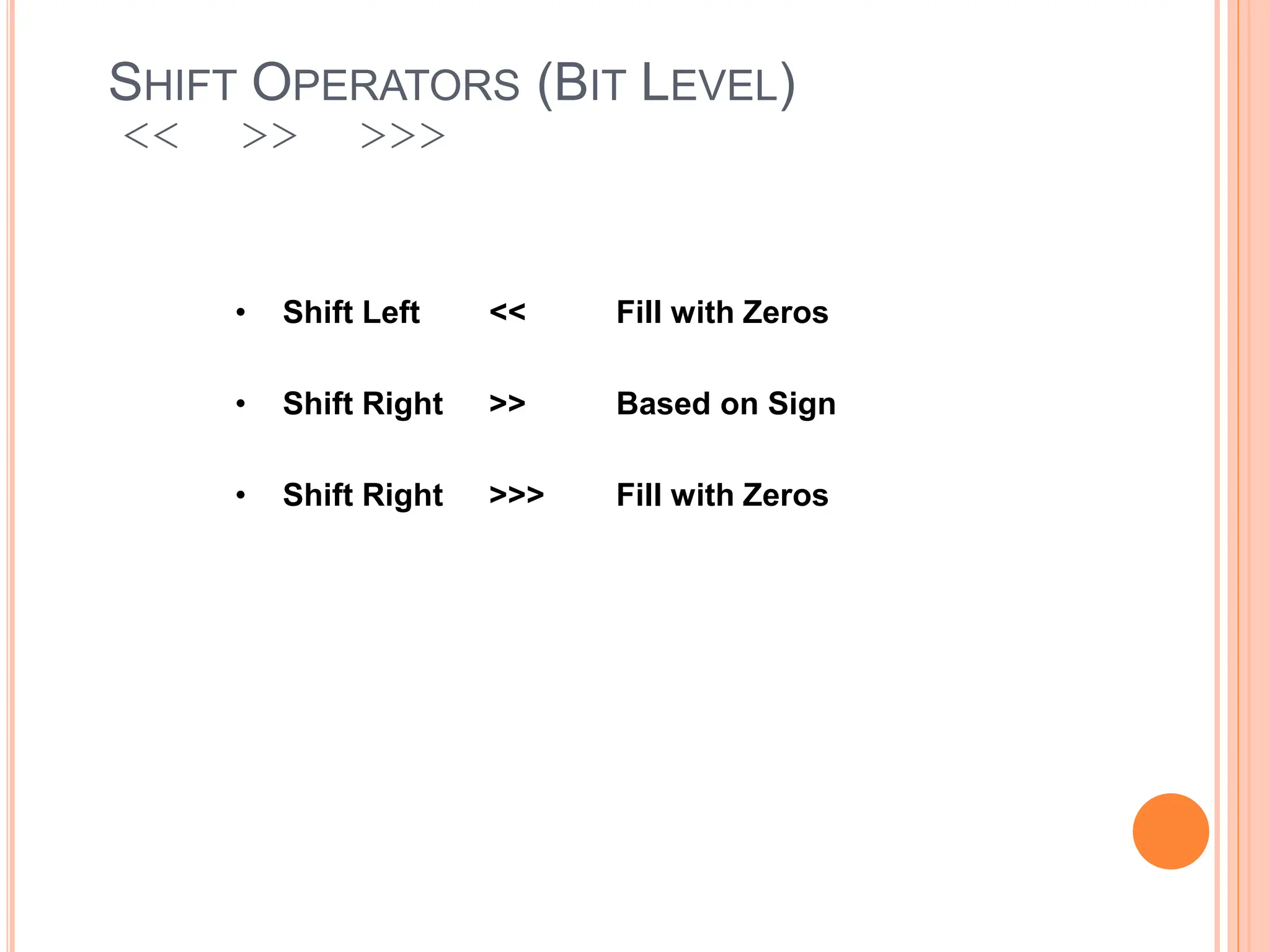
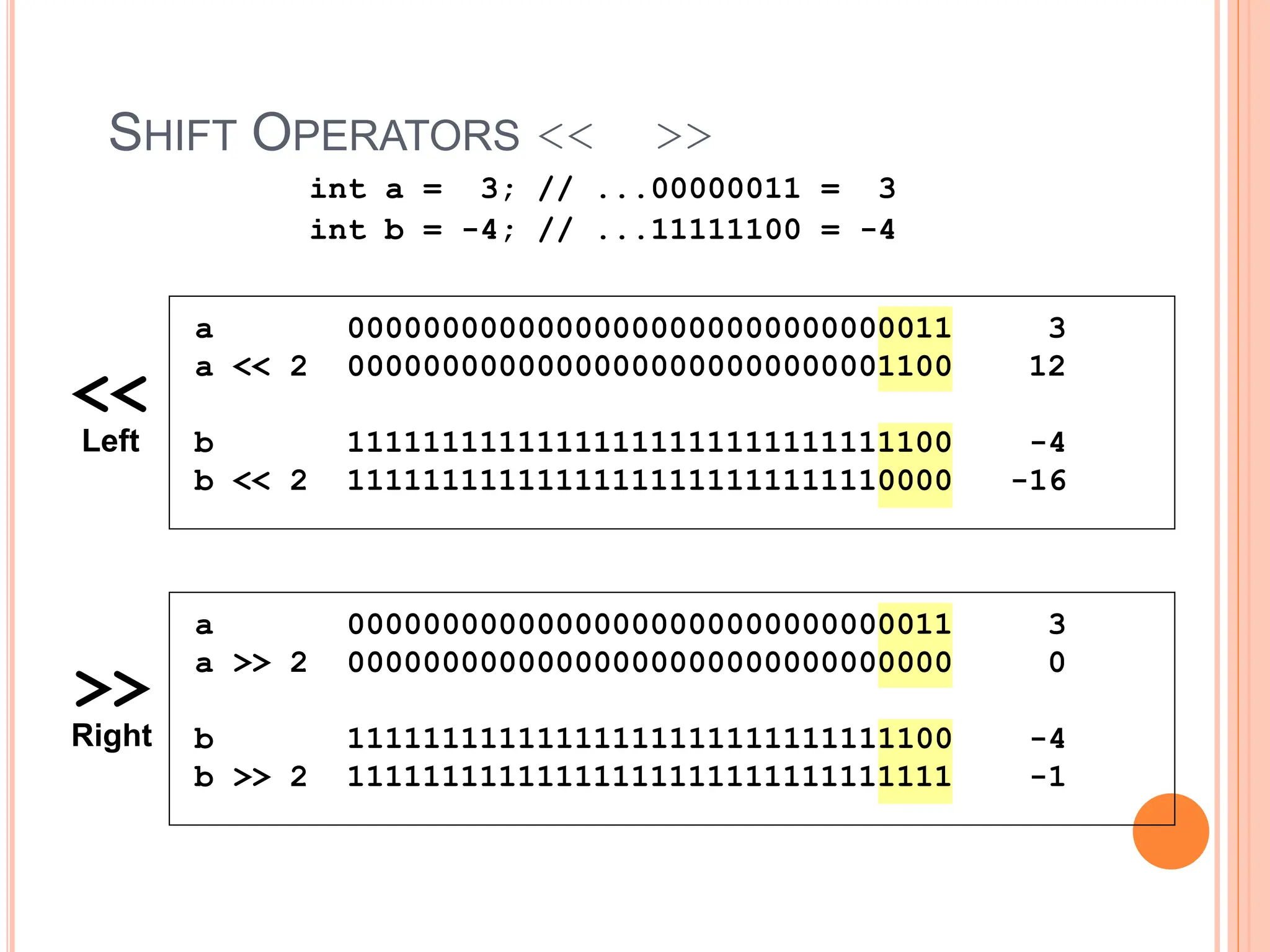
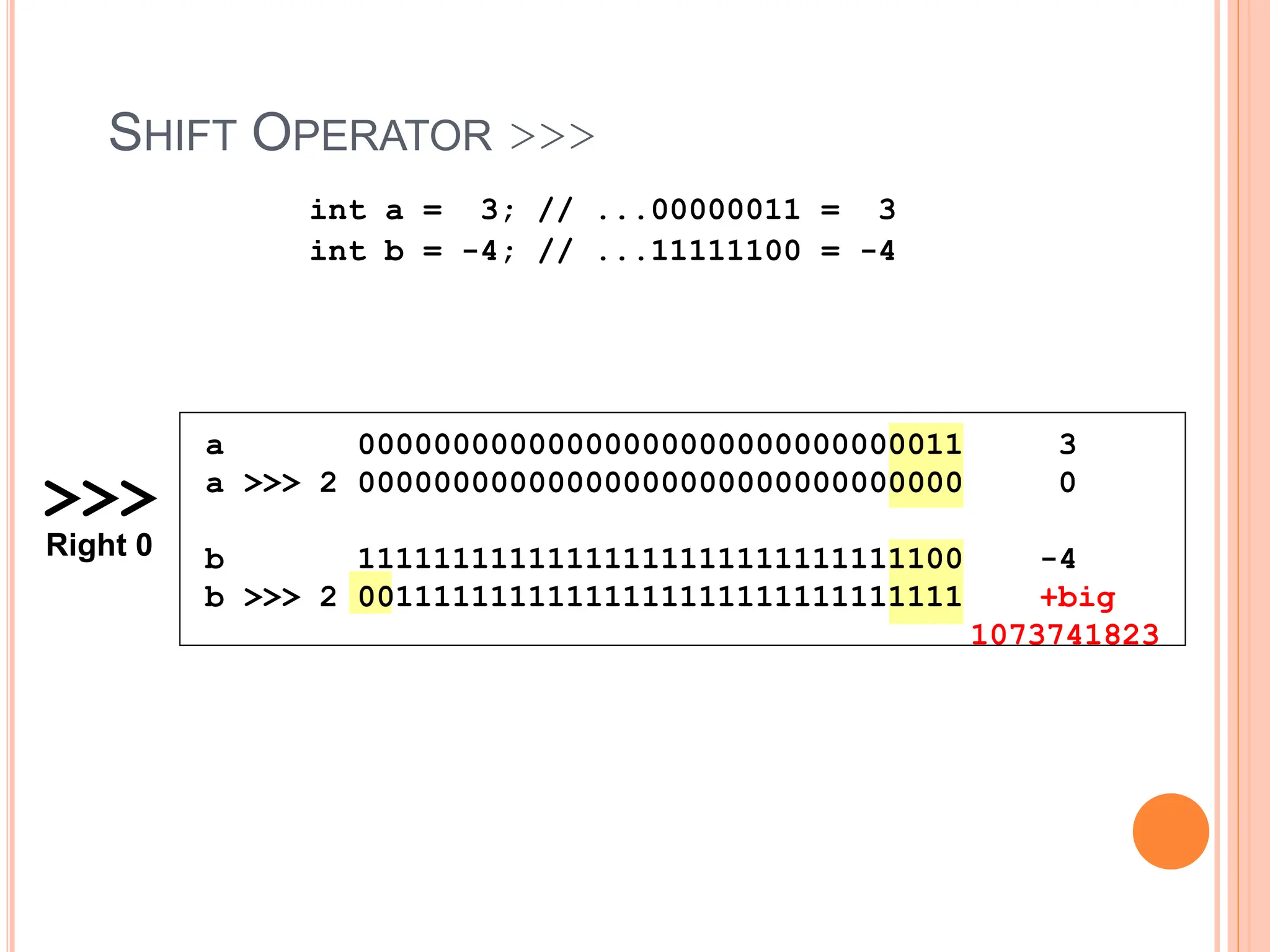
![SHIFT OPERATOR EXAMPLES public class Example { public static void main(String[] args) { int a = 3; // ...00000011 = 3 int b = -4; // ...11111100 = -4 System.out.println("a<<2 = " + (a<<2)); System.out.println("b<<2 = " + (b<<2)); System.out.println("a>>2 = " + (a>>2)); System.out.println("b>>2 = " + (b>>2)); System.out.println("a>>>2 = " + (a>>>2)); System.out.println("b>>>2 = " + (b>>>2)); } } > java Example a<<2 = 12 b<<2 = -16 a>>2 = 0 b>>2 = -1 a>>>2 = 0 b>>>2 = 1073741823 >](https://image.slidesharecdn.com/lec0320240115-240318141523-30498254/75/object-oriented-programming-java-lectures-43-2048.jpg)
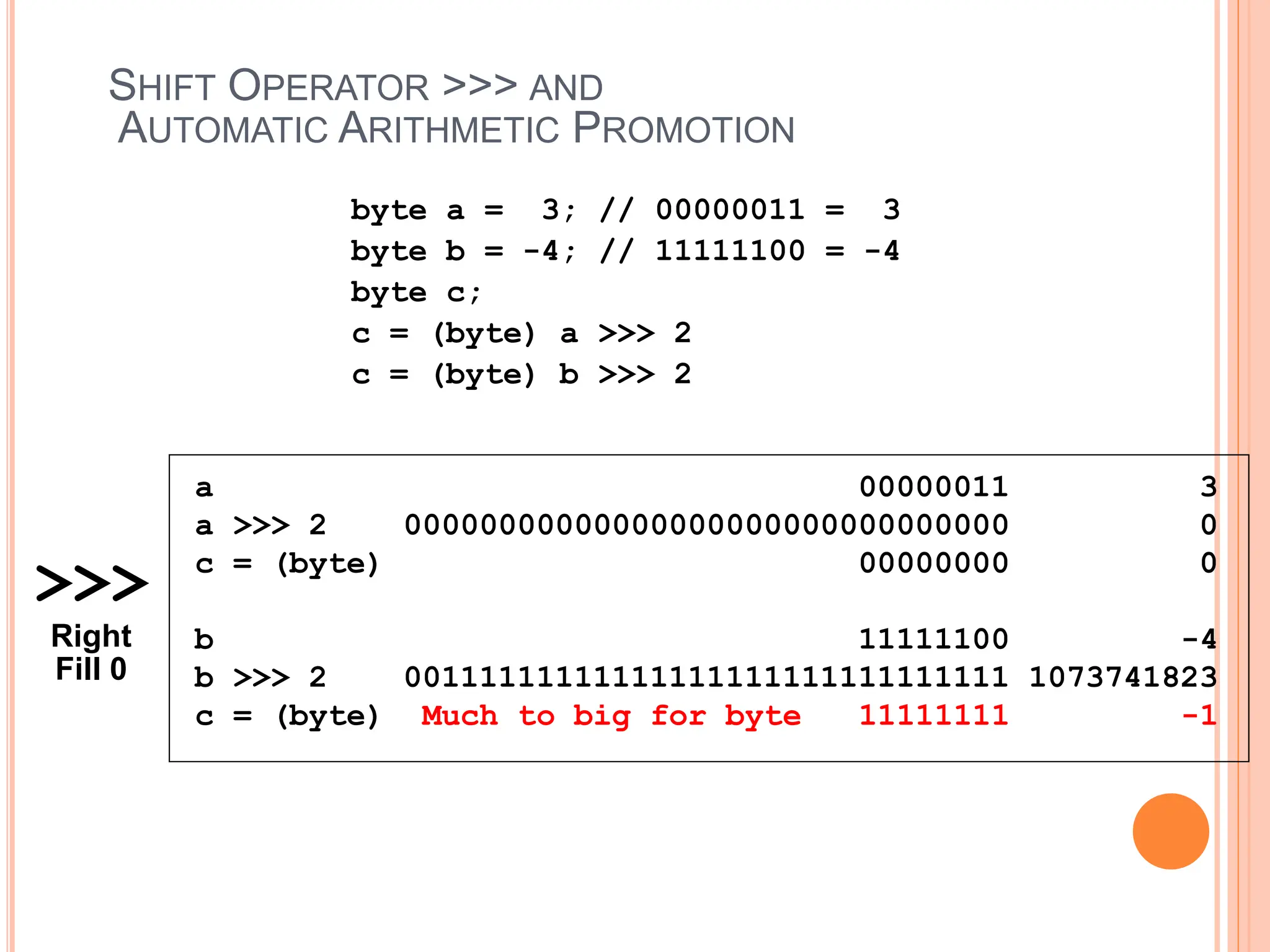
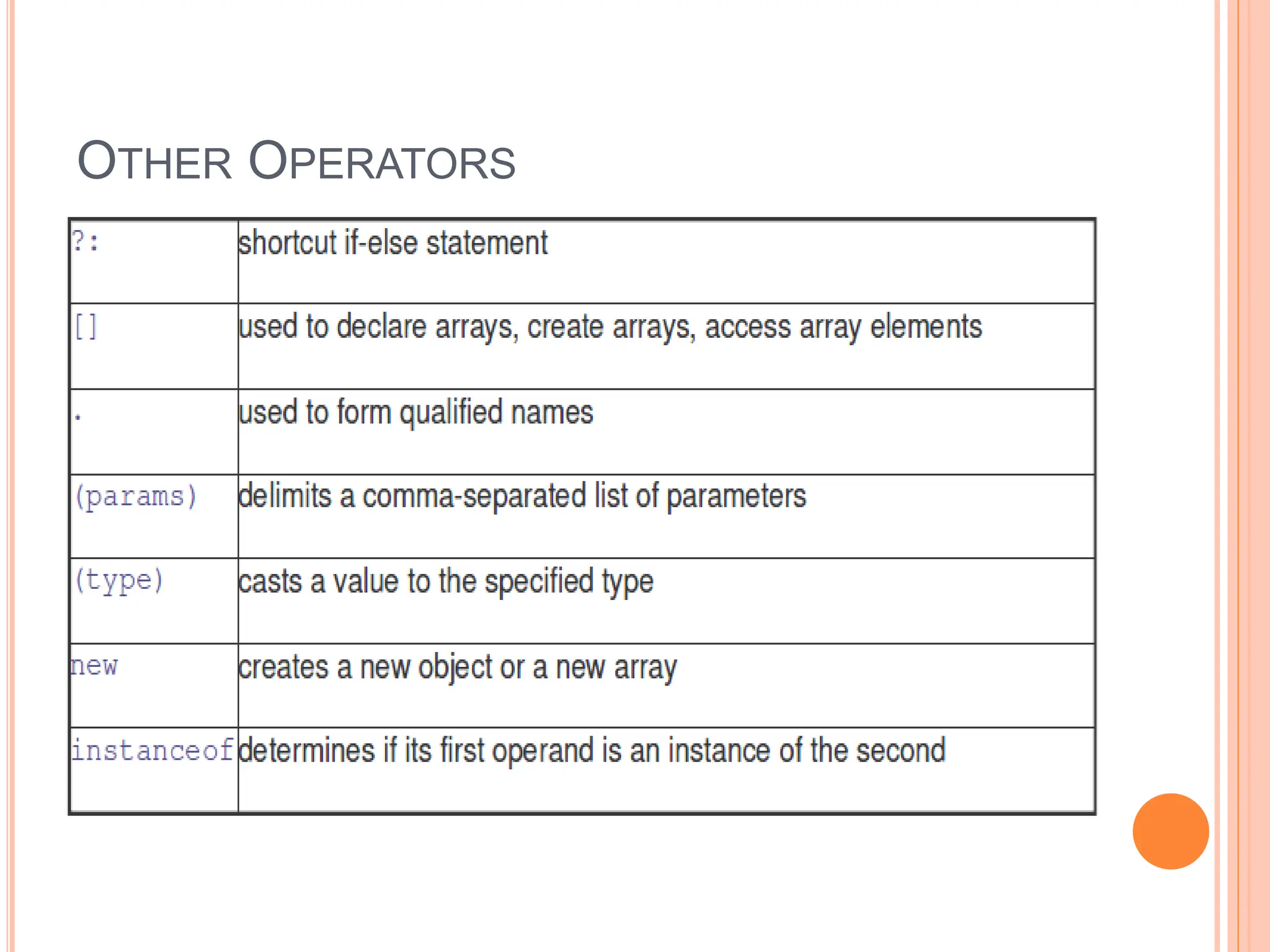
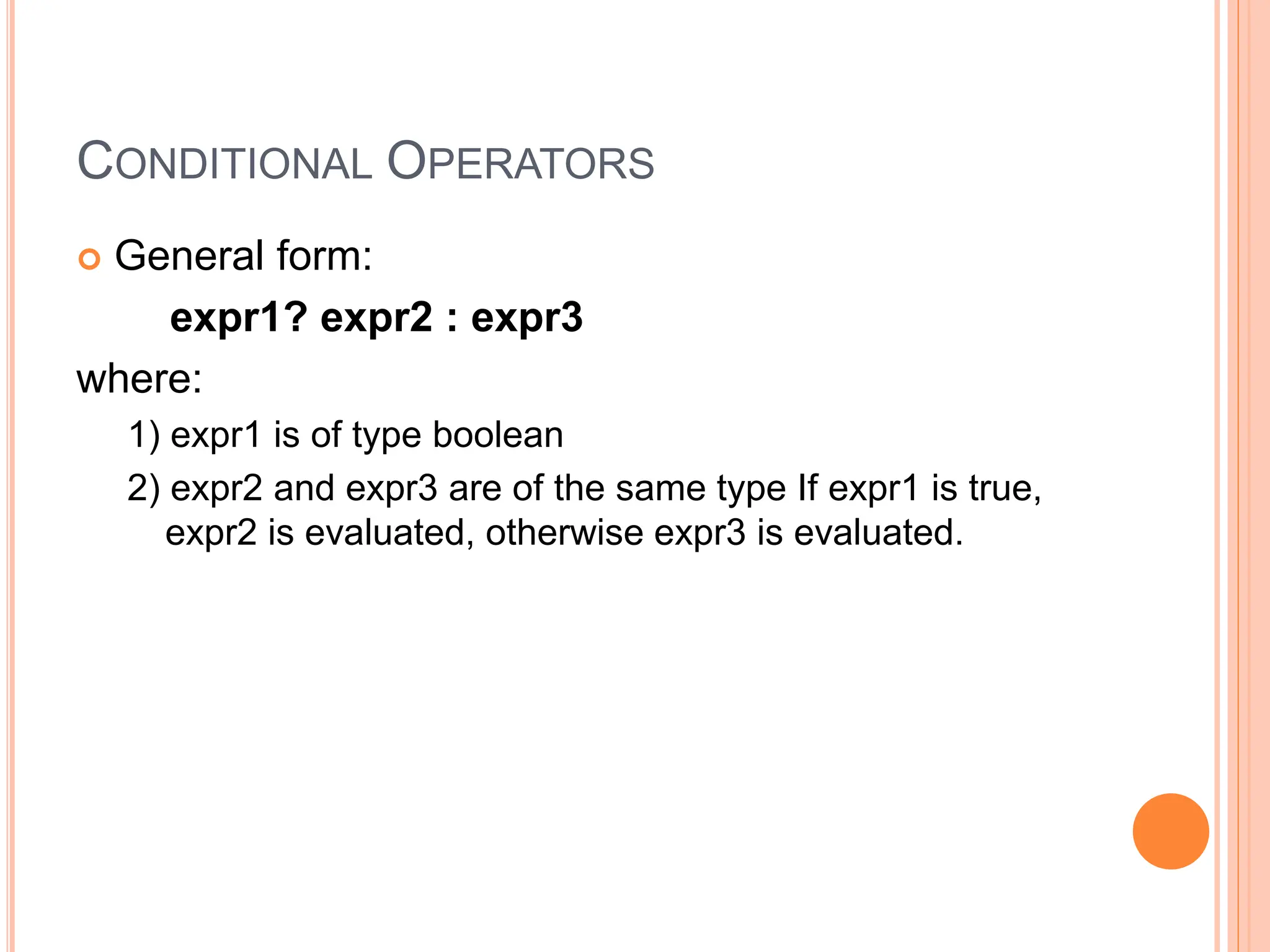
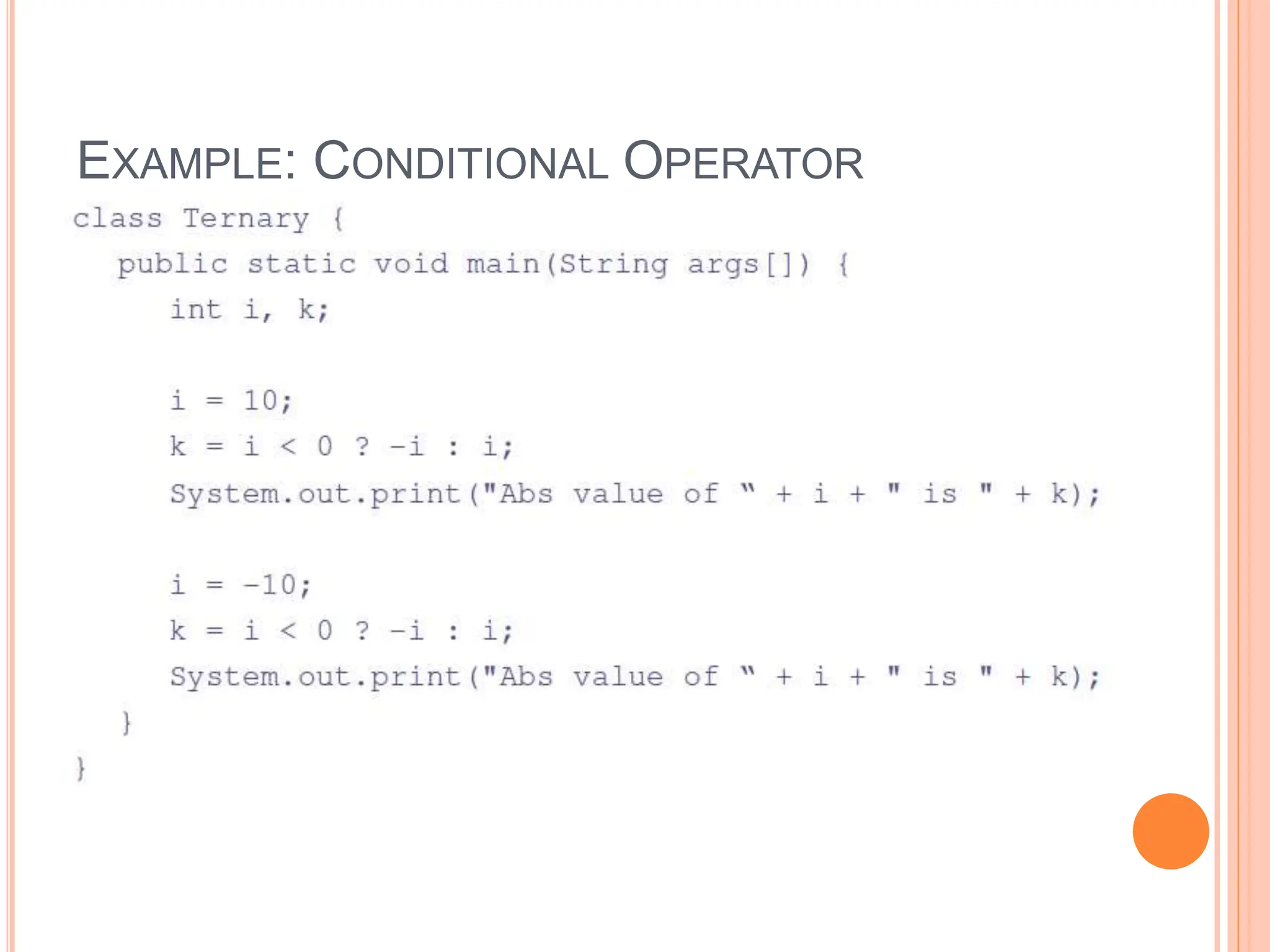
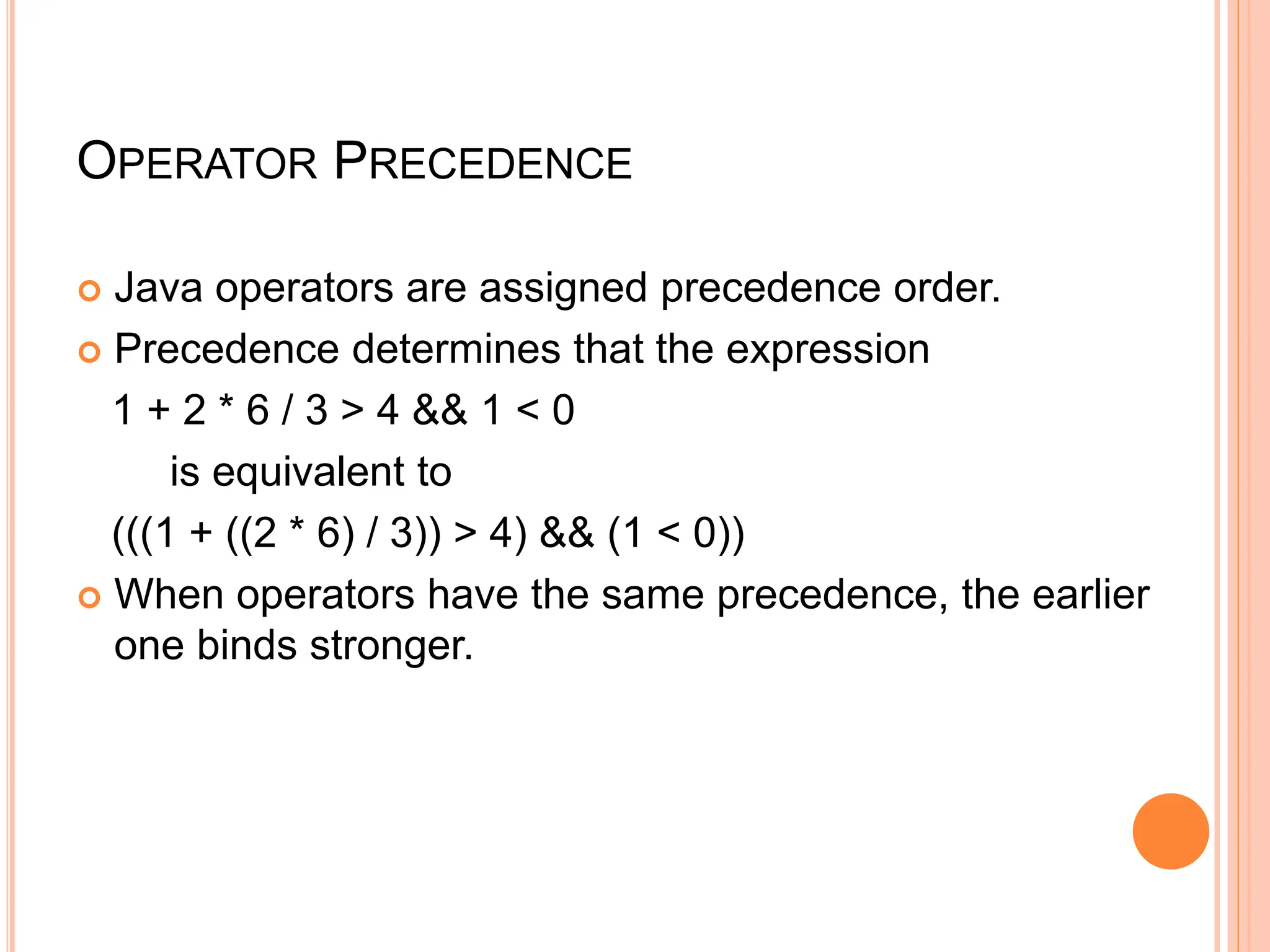
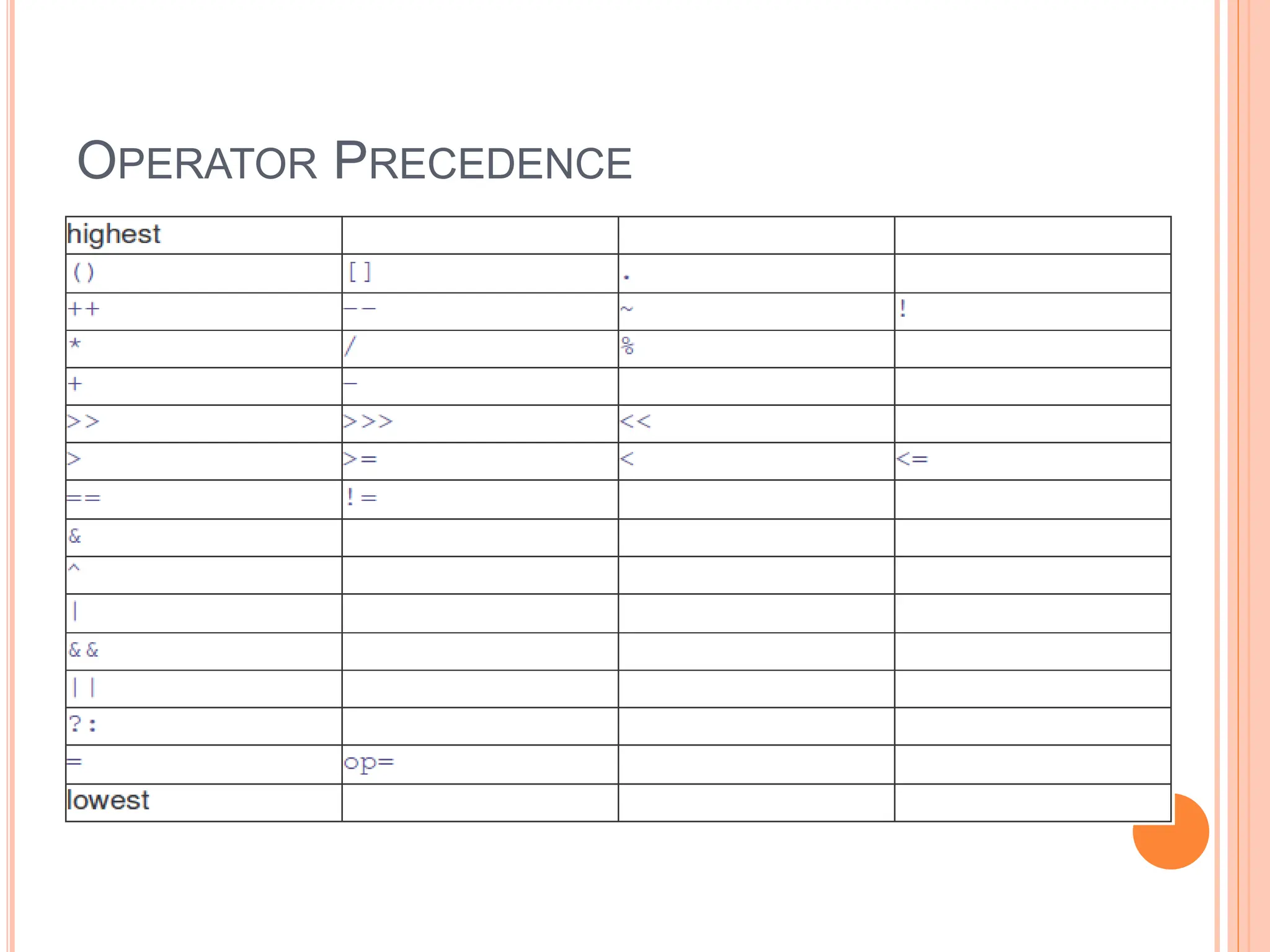
![CLASS PARTICIPATION 1) What would be the result of running the following program: Class test {public static void main(String abc[]) { byte x=256; System.out.println(x); } } a) 256 b) Compilation Error c) Run Time Error](https://image.slidesharecdn.com/lec0320240115-240318141523-30498254/75/object-oriented-programming-java-lectures-50-2048.jpg)
